Chia Seeds in Vegan Diet
Exploring the Health Effects of Vegan Superfood Seeds

I’ve stumbled upon a fascinating theory about the potential health advantages of seeds that are commonly referred to as superfoods for individuals following a vegan diet.
These tiny powerhouses, like chia seeds, may hold tremendous benefits for our well-being. Packed with essential nutrients, they could play a pivotal role in promoting heart health and providing plant-based protein.
But what about their impact on digestion? Join me as we delve into the evidence and explore the potential of these seeds to transform our health and nourish our bodies.
Get ready to embark on a journey towards liberation through the wonders of vegan superfood seeds.

Key Takeaways
- Chia seeds are a vegan superfood seed that offer numerous health benefits.
- They aid in weight loss by promoting feelings of fullness and reducing calorie intake.
- Chia seeds help manage blood sugar levels by slowing down carbohydrate digestion.
- They are rich in fiber, protein, omega-3 fatty acids, and antioxidants, providing essential nutrients for overall well-being.
Potential Benefits of Chia Seeds
In my exploration of the health effects of vegan superfood seeds, I’ve discovered numerous potential benefits associated with incorporating chia seeds into one’s diet.
Chia seeds have gained popularity in recent years due to their potential role in weight loss. These tiny seeds are packed with fiber, which can help promote feelings of fullness and reduce calorie intake. Additionally, chia seeds have a unique ability to absorb water and form a gel-like substance in the stomach, which further aids in appetite control.
Moreover, chia seeds may be beneficial for managing blood sugar levels. The high fiber content in chia seeds slows down the digestion of carbohydrates, preventing rapid spikes in blood sugar levels. This can be particularly beneficial for individuals with diabetes or those looking to maintain stable blood sugar levels.
Transitioning into the next section about the nutritional value of chia seeds, let’s delve deeper into the specific nutrients they offer.
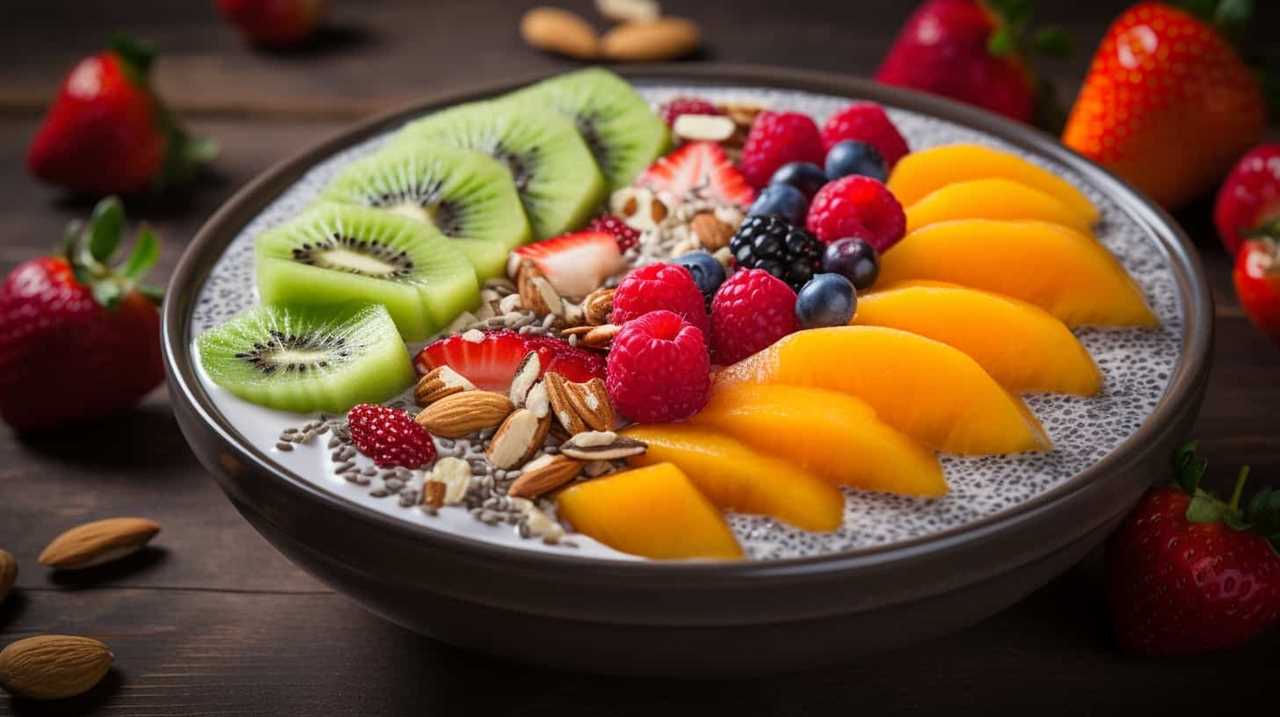
Nutritional Value of Chia Seeds
Chia seeds provide a rich array of essential nutrients for optimal health. These tiny seeds are packed with fiber, protein, omega-3 fatty acids, calcium, magnesium, and antioxidants. They’re also a great source of vitamins such as thiamine, niacin, and vitamin E.
The culinary uses of chia seeds are versatile, making them an easy addition to a variety of dishes. They can be sprinkled on top of salads, yogurt, or smoothies, and can even be used as an egg substitute in baking.
Additionally, chia seeds have gained popularity as a weight loss aid due to their high fiber content. When consumed, chia seeds absorb liquid and expand in the stomach, promoting feelings of fullness and reducing appetite.
Incorporating chia seeds into your diet can provide numerous health benefits and support your weight loss goals.
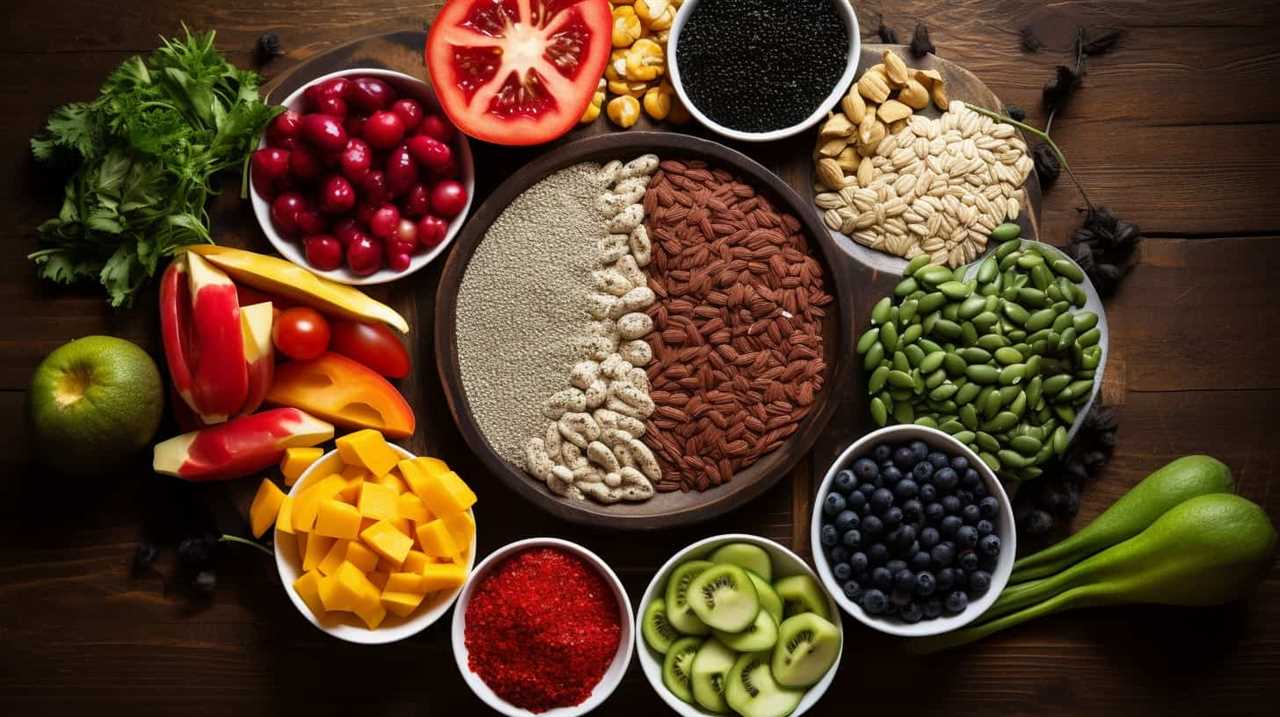
Role of Chia Seeds in Promoting Heart Health
As someone who values their heart health, I’ve discovered that incorporating chia seeds into my diet plays a crucial role in maintaining a healthy cardiovascular system. Chia seeds aren’t only packed with essential nutrients, but they also offer several benefits specifically related to heart health.
Here are four reasons why chia seeds are beneficial for promoting heart health:
-
Chia seeds and their role in weight management: Chia seeds are high in fiber, which helps promote a feeling of fullness and can aid in weight management. Maintaining a healthy weight is important for overall heart health.
-
Chia seeds and their potential anti-inflammatory effects: Chronic inflammation is linked to several heart diseases. Chia seeds contain omega-3 fatty acids, which have been shown to reduce inflammation in the body and promote heart health.
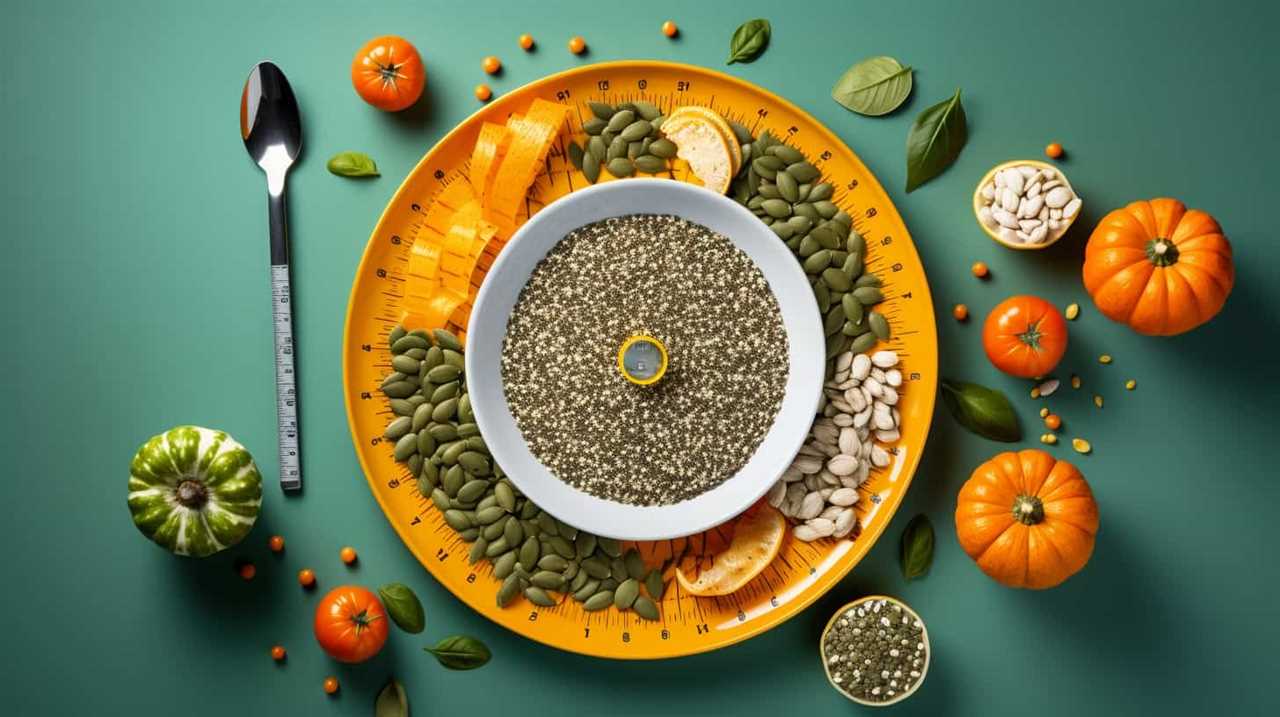
-
Rich in antioxidants: Chia seeds are rich in antioxidants, which help protect the heart from damage caused by free radicals. Antioxidants also help reduce oxidative stress, which is associated with heart disease.
-
Lowering cholesterol levels: Studies have shown that chia seeds can help lower LDL cholesterol levels, also known as ‘bad’ cholesterol. High levels of LDL cholesterol can increase the risk of heart disease.
Incorporating chia seeds into your diet can have a positive impact on heart health.
Chia Seeds as a Source of Plant-Based Protein
Continuing the exploration of chia seeds’ benefits for heart health, I find that they also serve as an excellent source of plant-based protein. Incorporating chia seeds into your diet is a great way to boost your protein intake, especially if you follow a plant-based or vegan lifestyle. These tiny seeds are packed with essential amino acids, making them a complete protein source.
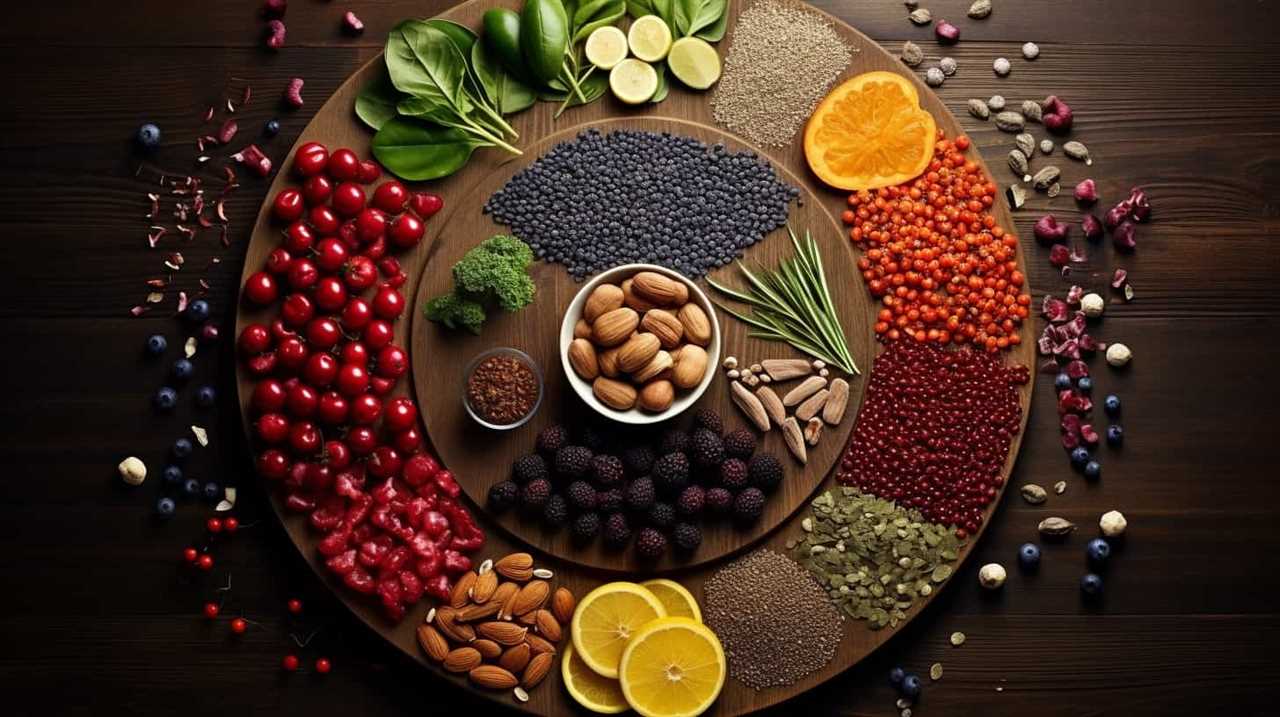
Here’s a table comparing the protein content of chia seeds to other plant-based protein alternatives:
| Protein Content per 100g | Chia Seeds | Quinoa | Lentils | Almonds | Tofu |
|---|---|---|---|---|---|
| Protein (g) | 16.5 | 14.1 | 9 | 21.2 | 8 |
As you can see, chia seeds are a great option when it comes to plant-based protein. They can be easily incorporated into various recipes, such as smoothies, puddings, and baked goods. So, if you’re looking for a nutritious and versatile plant-based protein source, consider adding chia seeds to your pantry.
Chia Seeds and Their Impact on Digestion
After exploring the benefits of chia seeds as a source of plant-based protein, it’s important to consider their impact on digestion.
Chia seeds are known for their high fiber content, which can promote healthy digestion. The fiber in chia seeds acts as a prebiotic, providing nourishment for the beneficial bacteria in our gut. This can help improve overall gut health and regularity.
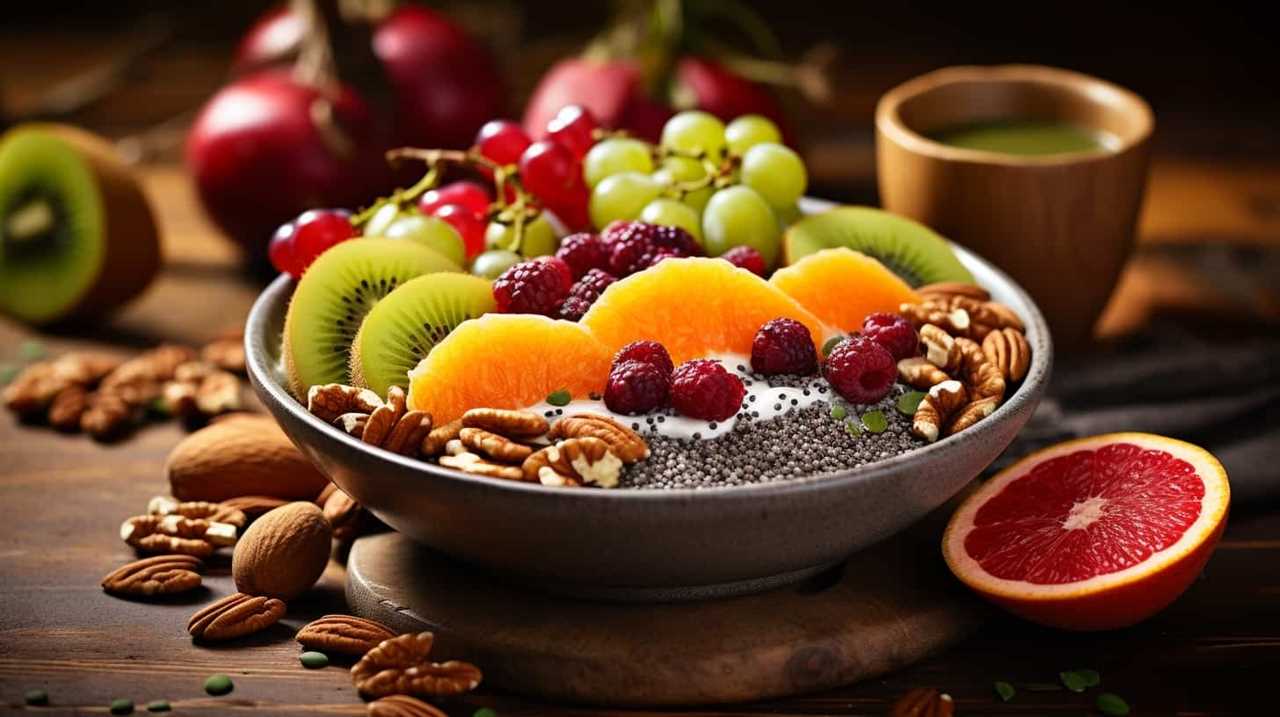
Additionally, the high fiber content of chia seeds can help promote feelings of fullness, which may aid in weight loss efforts. The gel-like consistency that chia seeds form when soaked in liquid also helps to slow down digestion, allowing for better nutrient absorption and a more controlled release of energy.
Frequently Asked Questions
Can Chia Seeds Help With Weight Loss?
Yes, chia seeds can help with weight loss. They are a great source of omega 3 fatty acids, which can reduce inflammation and promote fat burning. Additionally, chia seeds are a natural energy booster, aiding in physical activity and calorie burning.
Are There Any Potential Side Effects of Consuming Chia Seeds?
I haven’t experienced any potential allergic reactions or digestive issues from consuming chia seeds. However, it’s important to note that everyone’s body is different, so it’s always best to listen to your own body and consult a healthcare professional if needed.
How Can Chia Seeds Be Incorporated Into a Vegan Diet?
Incorporating chia seeds into vegan recipes can be a great way to boost nutrition. They can be used as a topping for smoothie bowls, added to baked goods, or mixed into homemade energy bars. Get creative and enjoy the benefits!
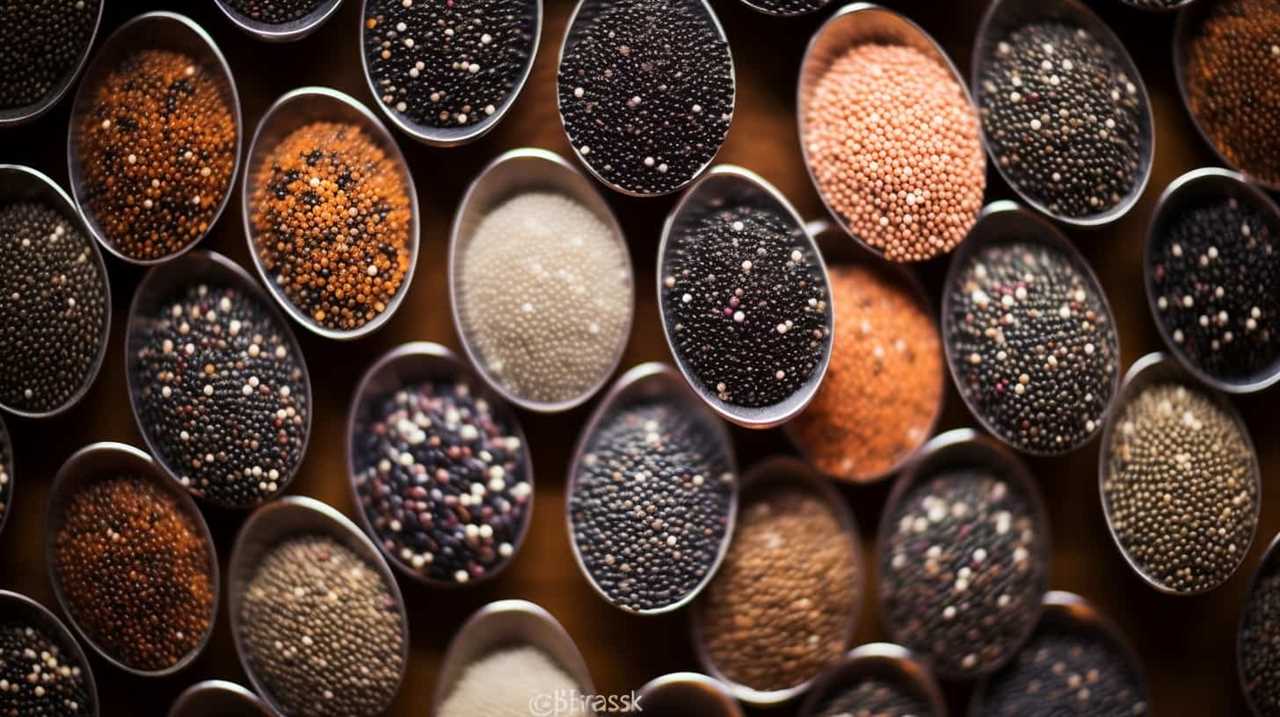
Can Chia Seeds Help Regulate Blood Sugar Levels?
Chia seeds can potentially benefit individuals with diabetes by helping regulate blood sugar levels. They may aid in maintaining stable glycemic control, which is essential for managing diabetes.
Are Chia Seeds Safe for Pregnant Women to Consume?
During pregnancy, it is generally safe to consume chia seeds. They are a good source of nutrients like omega-3 fatty acids, fiber, and protein. However, it’s important to consult with a healthcare provider for personalized advice.
Conclusion
In conclusion, chia seeds have emerged as a powerful superfood with numerous health benefits. They’re packed with essential nutrients, promote heart health, provide a rich source of plant-based protein, and aid in digestion.
These tiny seeds symbolize the potential for great change in our health and well-being. By incorporating chia seeds into our diet, we can take a small step towards a healthier, more vibrant life.
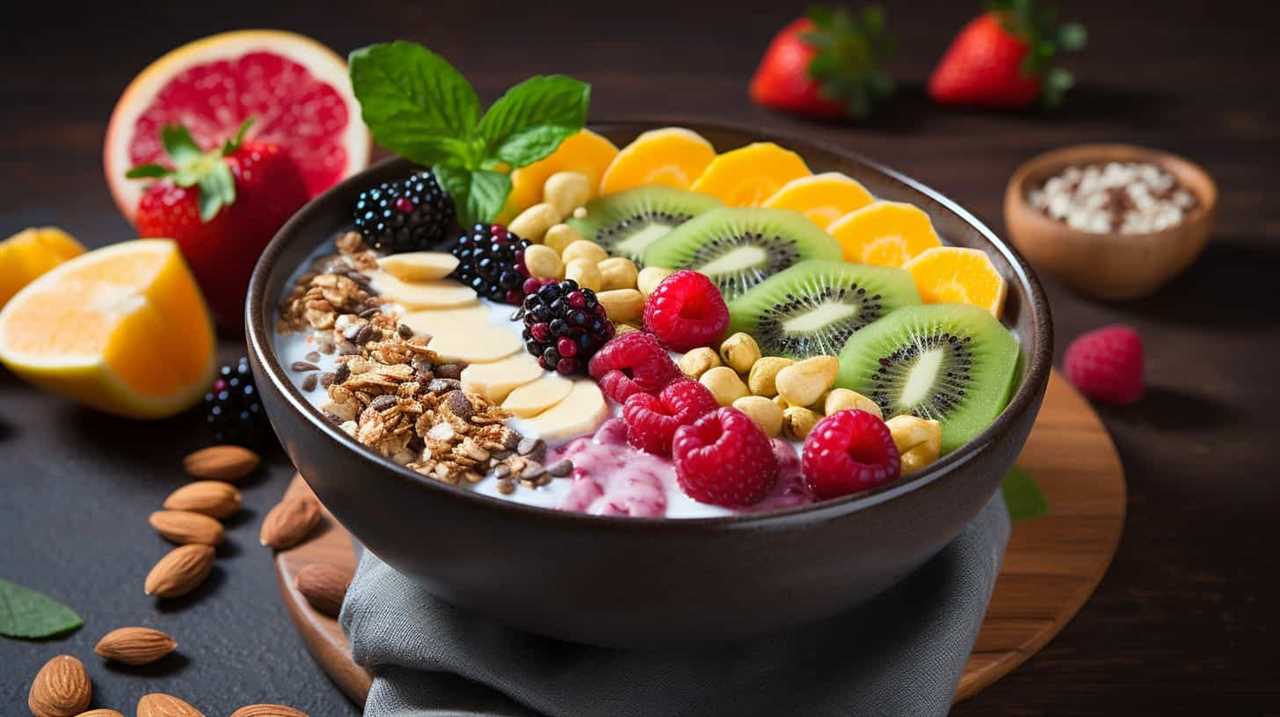
Let these seeds be a symbol of our commitment to nourishing our bodies and embracing a plant-based lifestyle.
Hi, I’m Sarah. I write for Turtle Tree Seeds, a news blog that loves food – all kinds of food. But especially bacon, chocolate, and veggies. We’re on a mission to show the world that you can enjoy all of those things, even kale and brussels sprouts. Because we believe that when it comes to food, there’s no such thing as guilty pleasures. Just pleasures.
I’m also a huge fan of puns (obviously).
Chia Seeds in Vegan Diet
11 Perks of Incorporating Seeds in Vegan Meals

Hello, my fellow plant-based cuisine lovers!
Are you looking for a way to add some extra oomph to your vegan meals? Well, look no further than the humble seed!
Packed with a plethora of perks, these tiny powerhouses can help you boost your heart health, improve brain function, and even aid in detoxification.
Get ready to unlock the 11 amazing benefits of incorporating seeds into your diet and take your vegan meals to a whole new level of delicious and nutritious delight.

Let’s dive in!
Key Takeaways
- Seeds in vegan meals are a rich source of omega-3 fatty acids, high in fiber content, and provide digestive health benefits.
- Incorporating seeds into vegan meals supports weight management and provides essential minerals.
- Seeds in vegan meals promote skin and hair health, nourish from within, and boost natural radiance.
- Seeds are a great source of essential nutrients, including vitamins, minerals, protein, and healthy fats, and they provide an energy boost, support athletic performance, enhance brain function, and aid in detoxification.
Rich Source of Omega-3 Fatty Acids
Seeds serve as an excellent source of omega-3 fatty acids, supporting my vegan diet with essential nutrients. Omega-3 fatty acids are essential for our overall health, and they play a crucial role in brain function, heart health, and reducing inflammation.
While fish is often touted as a rich source of omega-3s, there are plenty of plant-based options available for vegans. Chia seeds, flaxseeds, hemp seeds, and walnuts are all great sources of omega-3 fatty acids.
Incorporating these seeds into your meals can be as simple as sprinkling them on top of your favorite dishes like salads, smoothies, or oatmeal. You can also use ground flaxseeds or chia seeds as an egg substitute in baking.
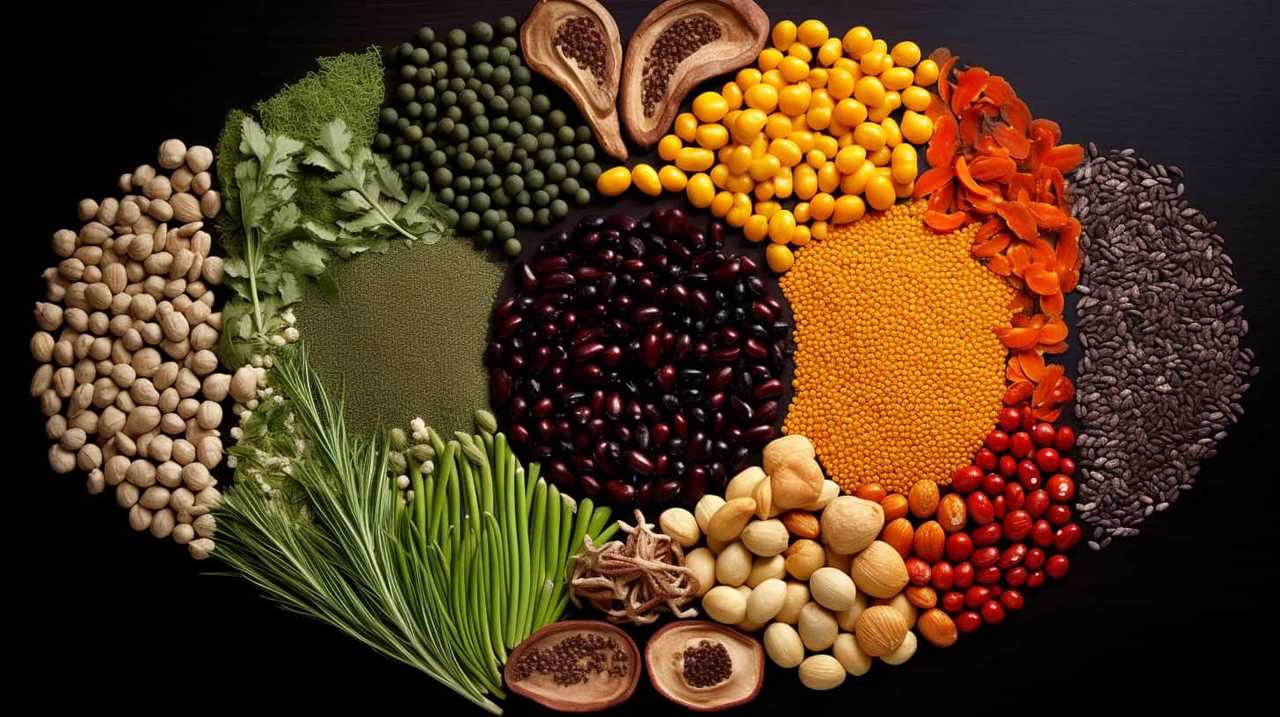
High in Fiber Content
Seeds are a valuable addition to vegan meals due to their high fiber content. Not only does fiber promote digestive health by aiding in regular bowel movements, but it also helps to keep you feeling full and satisfied, making it a helpful tool for weight management.
Additionally, seeds are nutrient-rich, providing essential vitamins, minerals, and antioxidants that contribute to overall health and well-being.
Digestive Health Benefits
One of the major benefits of incorporating seeds into my vegan meals is the improvement in my digestive health due to their high fiber content. Seeds, such as chia seeds, flaxseeds, and hemp seeds, are rich in dietary fiber, which plays a crucial role in maintaining gut health and promoting digestion.
Fiber adds bulk to the stool, making it easier to pass through the digestive tract, preventing constipation and promoting regular bowel movements. Moreover, fiber acts as a prebiotic, providing nourishment for the beneficial bacteria in the gut, which in turn supports a healthy digestive system.
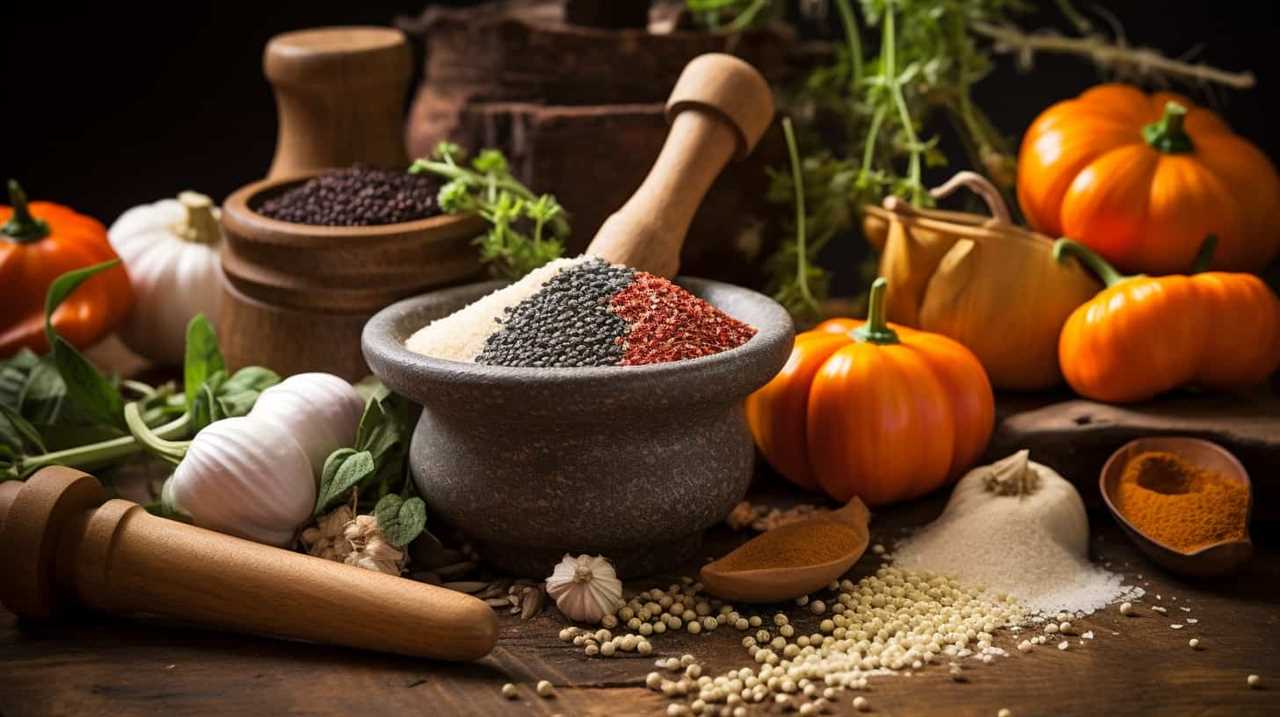
Weight Management Aid
Incorporating seeds into my vegan meals has frequently helped me manage my weight due to their high fiber content. Fiber is an essential nutrient that promotes satiety and aids in weight management. Here are three ways that seeds can assist in maintaining a healthy weight as part of a vegan meal plan:
-
Increased fullness: Seeds, such as chia and flaxseeds, possess a high water-absorbing capacity. When consumed, they expand in the stomach, leading to a feeling of fullness and reducing the likelihood of overeating.
-
Slow digestion: The soluble fiber found in seeds helps to slow down the digestion process. This slows the release of glucose into the bloodstream, preventing blood sugar spikes that can contribute to weight gain.
-
Reduced calorie intake: Seeds are low in calorie density, meaning they provide a substantial volume of food for fewer calories. By incorporating seeds into vegan meals, you can feel satisfied while consuming fewer calories, supporting healthy eating habits and weight management.
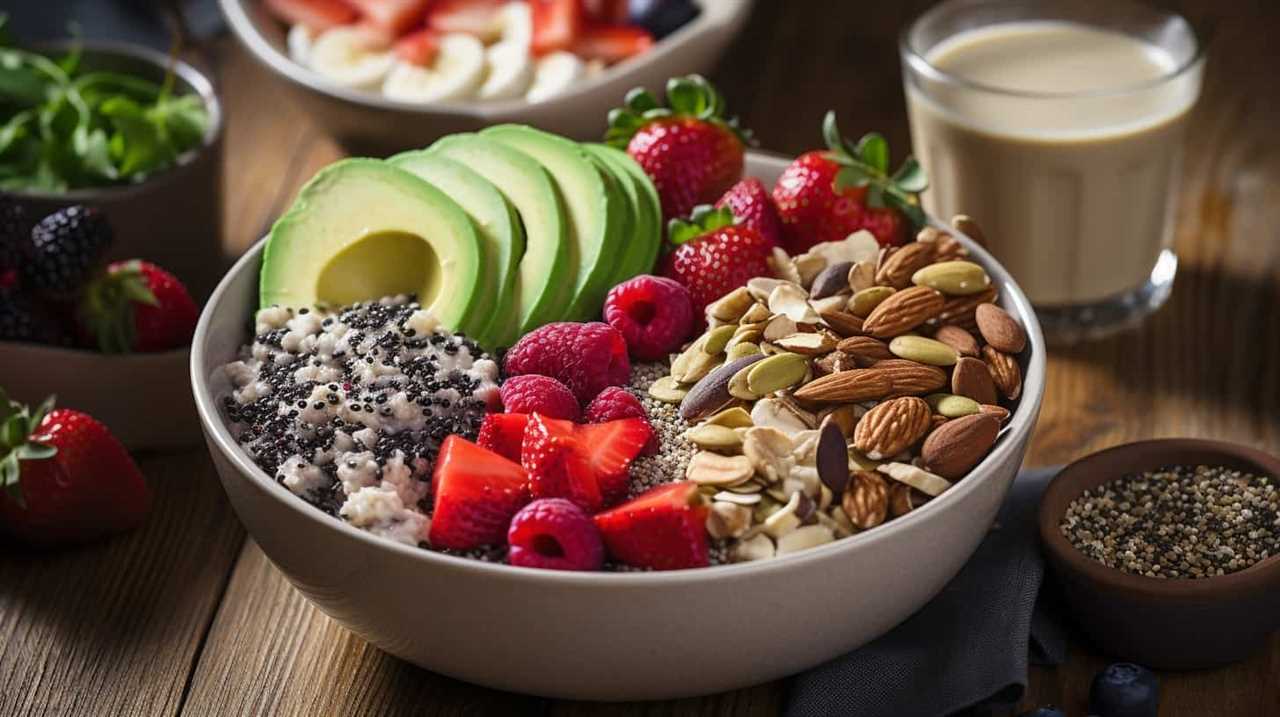
Nutrient-Rich Meal Addition
As a vegan, I’ve found that adding seeds to my meals is a nutrient-rich way to increase my fiber intake. Seeds such as chia, flax, and hemp are packed with fiber, which is essential for a healthy digestive system and overall well-being.
High-fiber diets have been linked to numerous health benefits, including immune system support and a reduced risk of chronic diseases such as heart disease and diabetes.
Additionally, incorporating seeds into meals can increase the satiety factor, helping to prevent overeating and aiding in weight management. These tiny powerhouses are also rich in vitamins, minerals, and antioxidants, making them a valuable addition to any plant-based diet.
So, by incorporating seeds into your meals, you can’t only boost your fiber intake but also support your immune system and promote satiety.
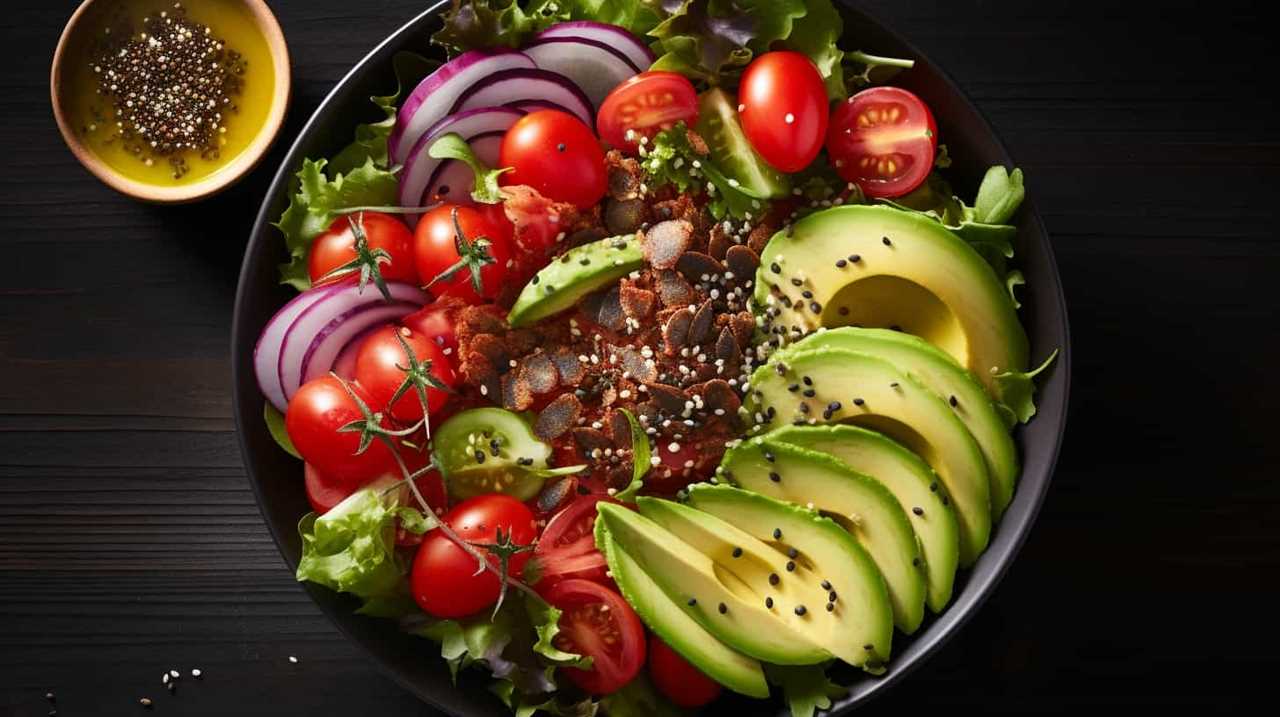
Transitioning to the next section, let’s now explore how seeds can boost heart health.
Boosts Heart Health
Including seeds in my vegan meals has been a great way to boost my heart health. Not only are seeds a delicious addition to my recipes, but they also provide numerous benefits for my cardiovascular system. Here are three ways incorporating seeds into my vegan meals has improved my heart health:
-
Rich in Omega-3 Fatty Acids: Seeds like flaxseeds and chia seeds are packed with heart-healthy omega-3 fatty acids. These essential fats help reduce inflammation, lower blood pressure, and decrease the risk of heart disease.
-
High in Fiber: Seeds are an excellent source of dietary fiber, which helps lower cholesterol levels and maintain a healthy weight. By including seeds in my meals, I can promote a healthy heart and reduce the risk of heart-related conditions.
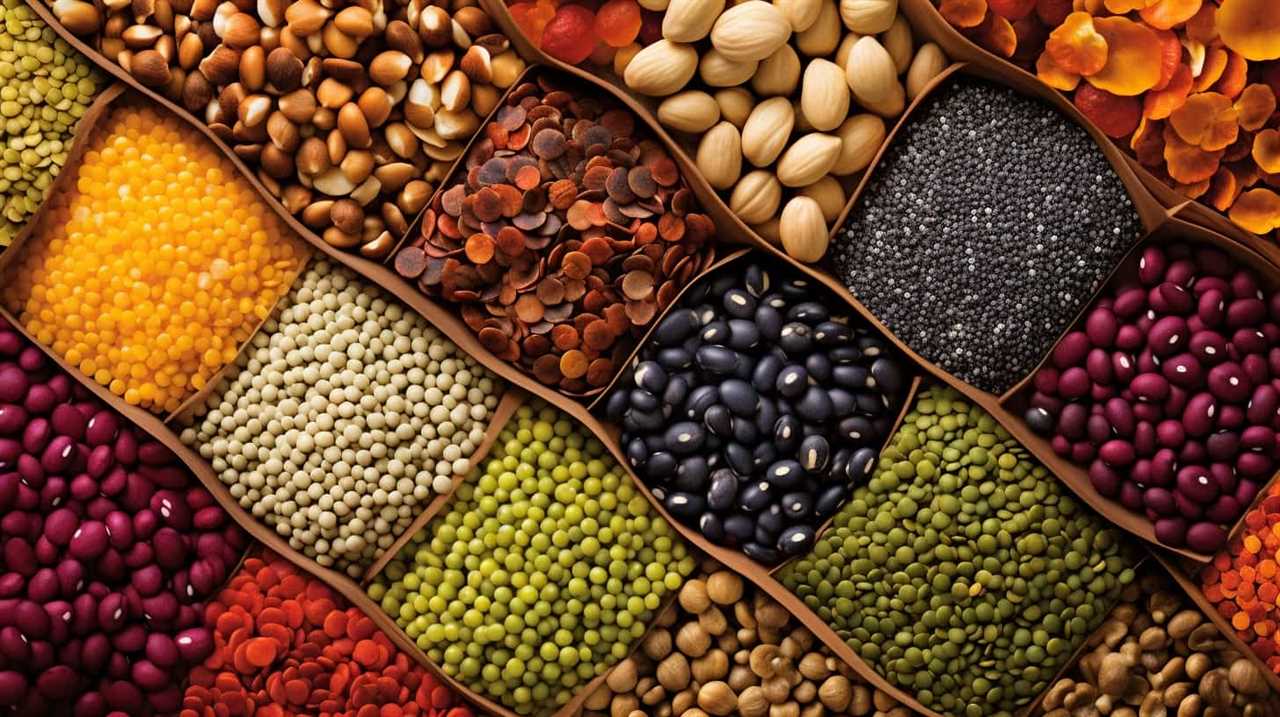
-
Antioxidant Powerhouses: Seeds are rich in antioxidants, such as vitamin E and selenium, which protect the heart from oxidative stress and reduce the risk of heart disease.
Incorporating seeds into my vegan meals not only adds flavor and texture but also provides essential nutrients that support a healthy heart. Try adding seeds to your favorite heart-healthy recipes and see the benefits for yourself!
Enhances Digestive Function
Seeds in my vegan meals have significantly improved my digestive function. Incorporating seeds into my diet has been a game-changer when it comes to improving my gut health and promoting healthy digestion.
Seeds are packed with fiber, which plays a crucial role in maintaining a healthy digestive system. Fiber adds bulk to the stool, preventing constipation and promoting regular bowel movements.

Additionally, seeds are rich in essential nutrients like omega-3 fatty acids and antioxidants, which help reduce inflammation in the gut and support overall digestive health. Chia seeds, for example, are known for their ability to absorb water and form a gel-like substance, which aids in digestion and can help alleviate symptoms of digestive disorders such as irritable bowel syndrome.
Supports Weight Management
Incorporating seeds into my vegan meals has been instrumental in supporting my weight management goals. Not only are seeds packed with essential nutrients, but they also offer unique benefits that aid in maintaining a healthy weight.
Here are three reasons why seeds are a great addition to vegan meal ideas for plant-based weight loss:
-
High in fiber: Seeds such as chia, flax, and hemp are rich in fiber, which helps to keep you feeling full and satisfied for longer periods of time. This can prevent overeating and support weight loss efforts.

-
Healthy fats: Seeds are a great source of healthy fats, including omega-3 fatty acids. These fats are known to promote satiety and can help regulate appetite, making it easier to manage weight.
-
Protein powerhouses: Many seeds, like pumpkin and sunflower seeds, are excellent sources of plant-based protein. Protein is essential for maintaining muscle mass while losing weight, as it helps to keep you feeling full and increases your metabolic rate.
Provides Essential Minerals
I have found that incorporating seeds into my vegan meals provides me with essential minerals for optimal health. Seeds are a nutrient-dense powerhouse, containing a wide variety of minerals that our bodies need to function properly.
For example, chia seeds are an excellent source of calcium, which is essential for strong bones and teeth. Flaxseeds are rich in magnesium, a mineral that plays a vital role in over 300 biochemical reactions in the body.

Promotes Skin and Hair Health
When it comes to promoting skin and hair health, incorporating seeds into your vegan meals can work wonders. Seeds are packed with essential nutrients that nourish your body from within, helping to boost natural radiance and give your skin a healthy glow.
Additionally, the vitamins and minerals found in seeds can strengthen hair follicles, leading to stronger, healthier hair.
Nourishes From Within
One of the key benefits of including seeds in my vegan meals is that they nourish my body from within, promoting the health of my skin and hair. Seeds are packed with essential nutrients that support optimal skin and hair function.
Here are three ways seeds can nourish and enhance my skin and hair:

-
Omega-3 fatty acids found in seeds like flaxseeds and chia seeds promote gut health, reducing inflammation and supporting a healthy complexion.
-
Seeds are rich in antioxidants, such as vitamin E, which protects the skin from oxidative stress and helps improve immune function, giving me a radiant and healthy appearance.
-
The protein content in seeds, such as hemp seeds and pumpkin seeds, supports hair growth and strength, preventing breakage and promoting luscious locks.
Boosts Natural Radiance
Incorporating seeds into my vegan meals not only nourishes my body from within but also boosts my natural radiance, promoting the health of my skin and hair.
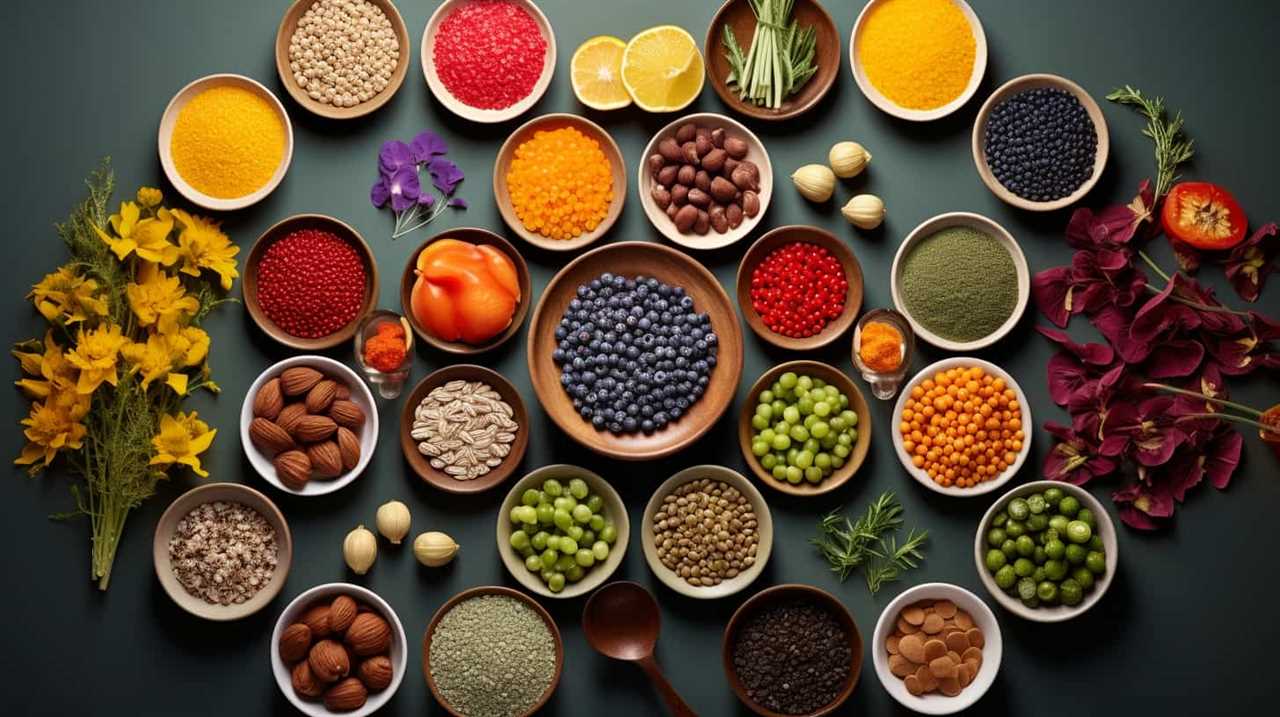
Seeds are a rich source of essential fatty acids, such as omega-3 and omega-6, which play a crucial role in maintaining skin elasticity and hydration. These fatty acids help to strengthen the skin barrier, preventing moisture loss and protecting against environmental damage.
Additionally, seeds are packed with antioxidants, vitamins, and minerals that promote collagen production, the protein responsible for maintaining the structure and firmness of the skin. By including seeds in my meals, I’m providing my body with the necessary nutrients to improve skin elasticity and achieve a radiant complexion.
Strengthens Hair Follicles
Continuing on, I regularly notice that incorporating seeds into my vegan meals not only boosts my natural radiance but also strengthens my hair follicles, promoting overall skin and hair health.
Here are three ways in which seeds support the health and growth of my hair naturally:
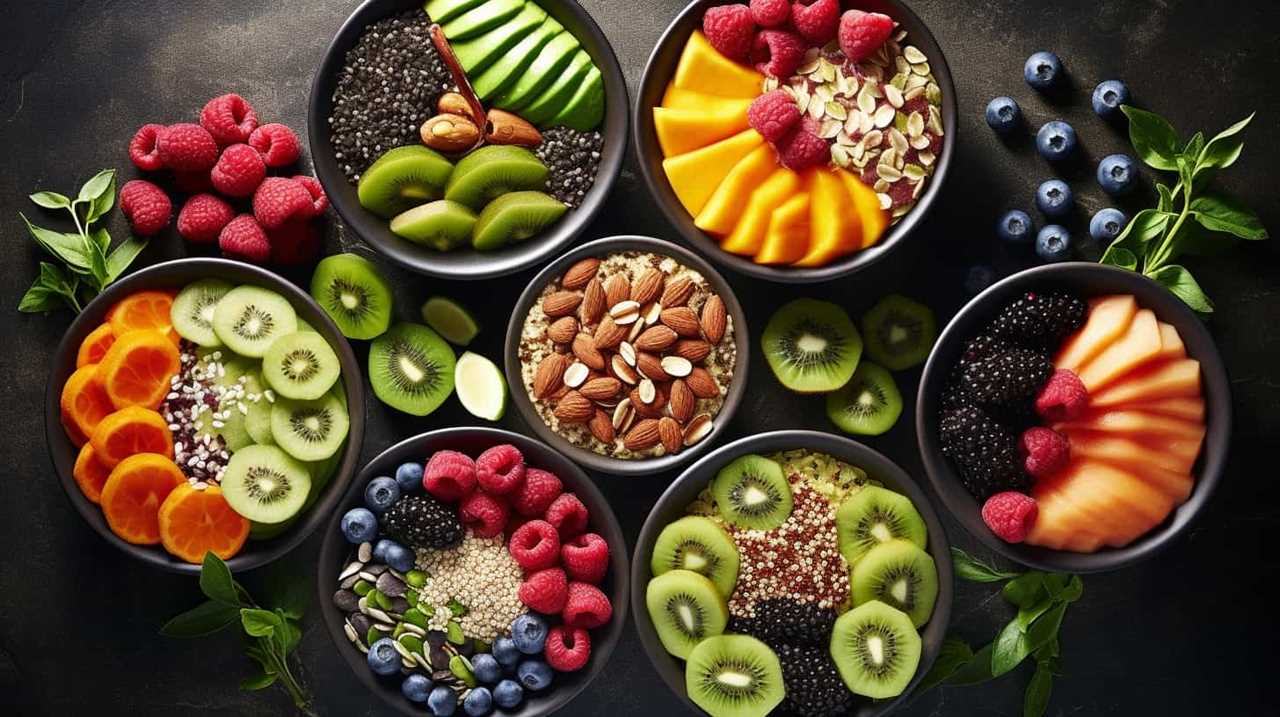
-
Rich in essential fatty acids: Seeds like flaxseeds, chia seeds, and hemp seeds are packed with omega-3 fatty acids that nourish the scalp and strengthen hair follicles from within. These fatty acids also reduce inflammation, which can contribute to hair loss.
-
High in protein: Seeds such as pumpkin seeds and sunflower seeds are excellent sources of plant-based protein. Protein is crucial for hair growth as it provides the building blocks for strong, healthy hair strands.
-
Loaded with vitamins and minerals: Seeds contain an array of vitamins and minerals like vitamin E, biotin, zinc, and selenium, which are essential for maintaining healthy hair. These nutrients promote hair growth, prevent hair breakage, and improve the overall health of the scalp.
By incorporating seeds into my vegan meals, I’m giving my hair the nourishment it needs to thrive.
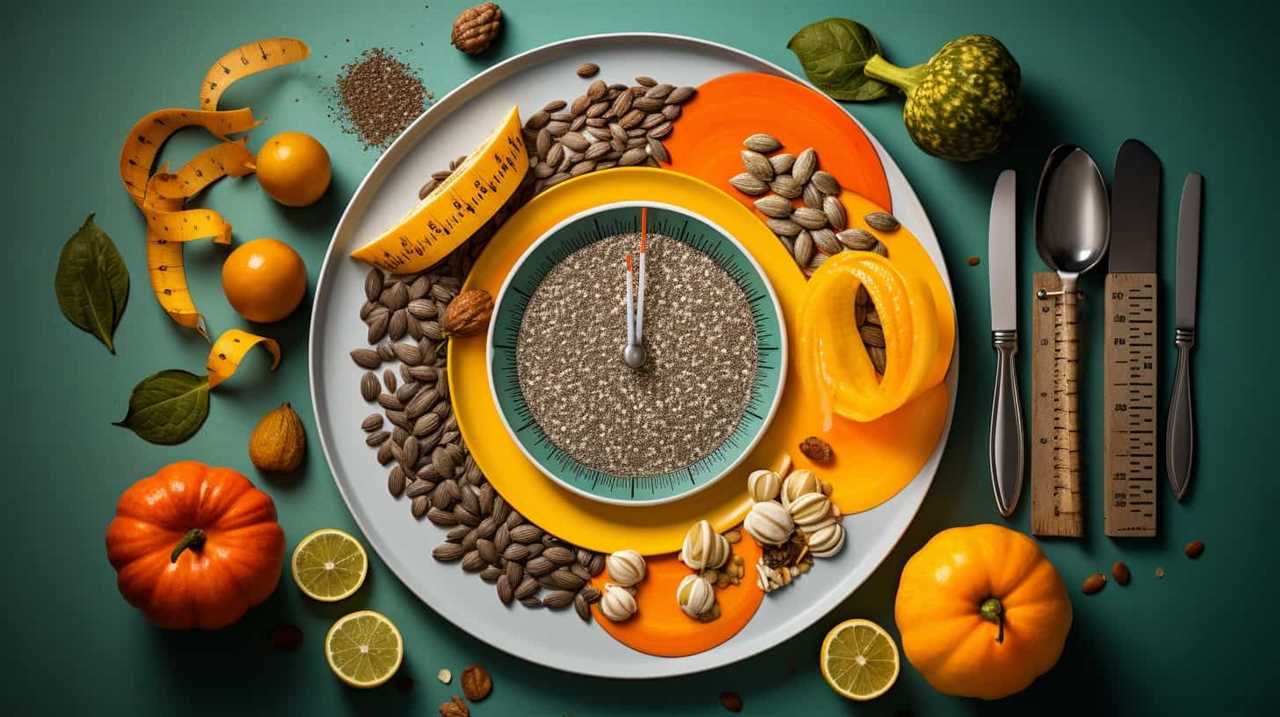
Now, let’s move on to how seeds support bone strength.
Supports Bone Strength
I have found that including seeds in my vegan meals significantly enhances bone strength. Seeds are a nutritional powerhouse, packed with essential minerals and vitamins that promote bone density and support overall bone health. They’re particularly rich in calcium, magnesium, phosphorus, and vitamin K, all of which are crucial for maintaining strong and healthy bones.
Calcium contributes to bone mineral density, while magnesium aids in calcium absorption and vitamin K helps in bone formation and repair. Additionally, the omega-3 fatty acids found in seeds have anti-inflammatory properties that promote joint health and reduce the risk of bone-related conditions like arthritis.
Boosts Energy Levels
As someone who’s always looking for ways to boost my energy levels, incorporating seeds into my vegan meals has been a game-changer. Seeds are a nutritional powerhouse, packed with vitamins, minerals, and essential fatty acids that support overall well-being and provide sustained energy.
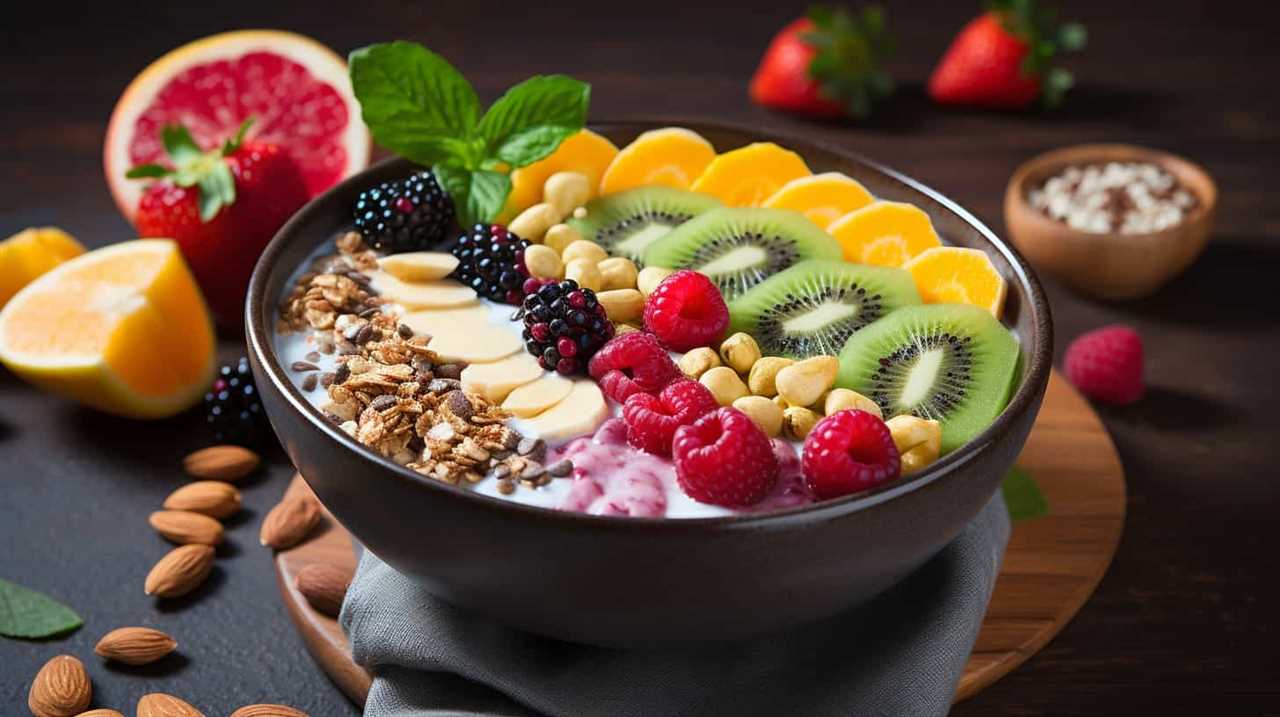
Whether I’m hitting the gym or just need a mid-afternoon pick-me-up, adding seeds like chia, flax, and hemp to my meals has enhanced my athletic performance and kept me energized throughout the day.
Nutritional Powerhouse
The inclusion of seeds in my vegan meals has proven to be a nutritional powerhouse, providing a significant boost to my energy levels. Here’s why:
-
Immune system boost: Seeds, such as chia and flaxseeds, are packed with essential nutrients like vitamins, minerals, and antioxidants. These help strengthen the immune system, keeping me healthy and energized.
-
Satiety factor: Seeds are rich in dietary fiber, which helps keep me fuller for longer periods. This prevents unnecessary snacking and helps maintain a stable energy level throughout the day.
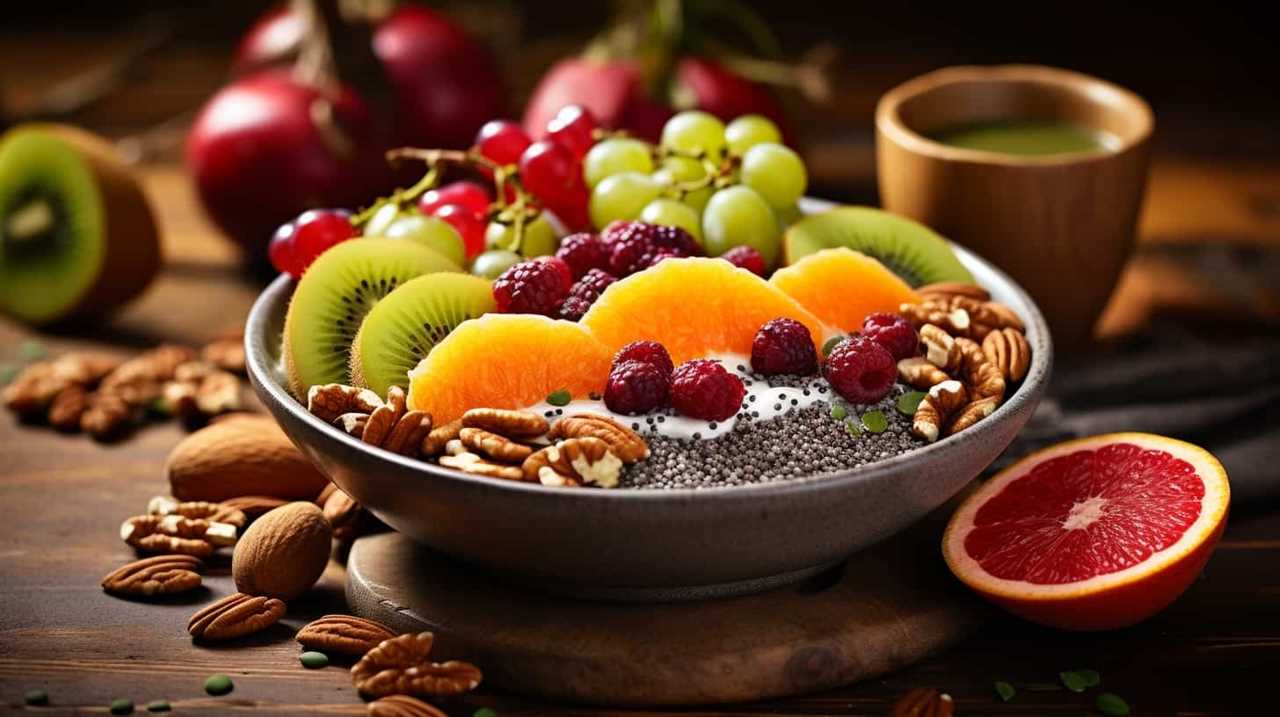
-
Nutrient density: Seeds are small but mighty, containing a concentrated amount of nutrients. They’re a great source of protein, healthy fats, and micronutrients like iron and magnesium. These nutrients are crucial for maintaining optimal energy levels and overall well-being.
Supports Overall Well-Being
How do seeds in vegan meals contribute to boosting energy levels and supporting overall well-being?
Incorporating seeds into your vegan meals can provide numerous benefits for your mental health and energy levels. Seeds are rich in essential nutrients, such as omega-3 fatty acids, protein, and fiber, which are all crucial for supporting mental well-being. Omega-3 fatty acids have been linked to improved mood and cognitive function, while protein and fiber promote satiety and regulate blood sugar levels, preventing energy crashes throughout the day. Additionally, seeds contain vitamins and minerals, like magnesium and iron, that play a vital role in energy production and reducing fatigue.
By incorporating seeds into your vegan meals, you can support your mental health, promote satiety, and maintain optimal energy levels throughout the day.
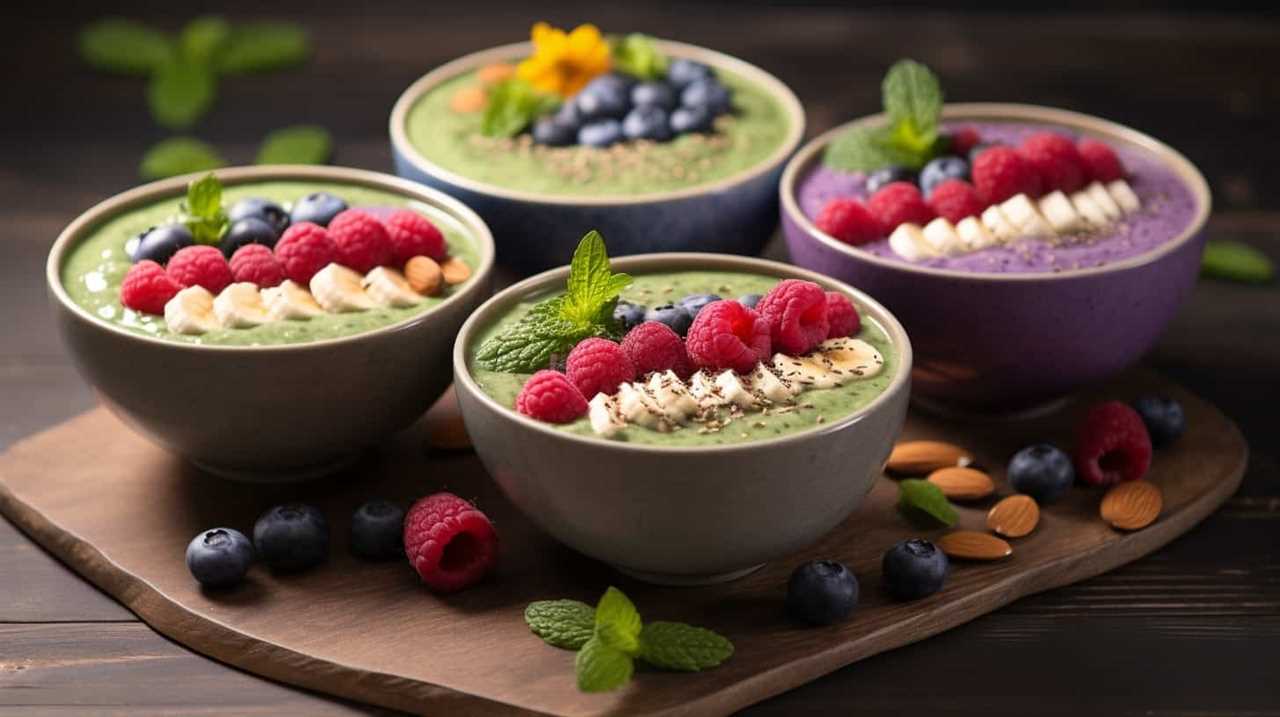
Transition: Now that we understand how seeds can support overall well-being and boost energy levels, let’s explore how they can enhance athletic performance.
Enhances Athletic Performance
Incorporating seeds in my vegan meals has significantly boosted my energy levels and enhanced my athletic performance. Here are three ways seeds have helped me improve my endurance and increase my stamina:
-
Rich in nutrients: Seeds like chia, flax, and hemp are packed with essential vitamins, minerals, and antioxidants that support overall health and provide sustained energy during workouts.
-
High in protein: Seeds are a great plant-based source of protein, which is crucial for muscle repair and growth. Consuming protein-rich seeds helps me recover faster from intense physical activity.
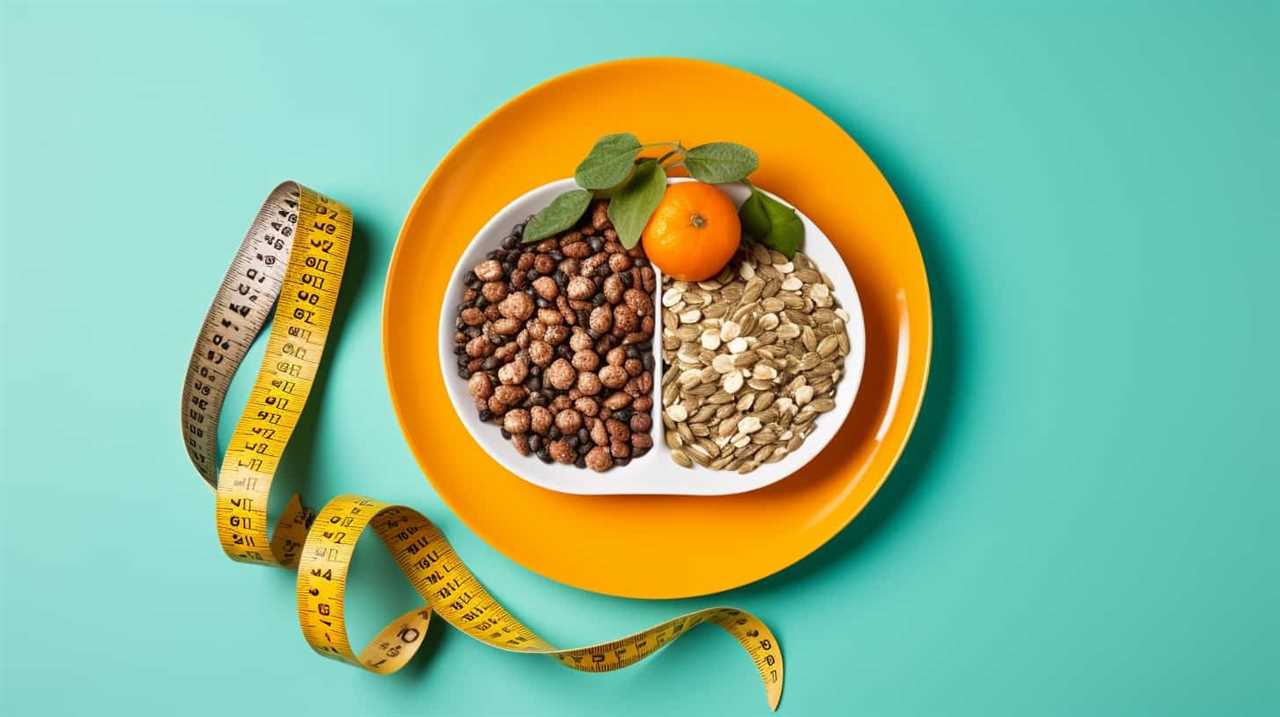
-
Omega-3 fatty acids: Seeds, particularly flax and chia, are abundant in omega-3 fatty acids, known for their anti-inflammatory properties. These healthy fats reduce exercise-induced inflammation, allowing me to train harder and for longer periods.
By incorporating seeds into my vegan meals, I’ve experienced a noticeable improvement in my athletic performance.
Now, let’s explore how seeds can also improve brain function.
Improves Brain Function
One key benefit of including seeds in my vegan meals is their ability to enhance brain function. Seeds are rich in nutrients that support cognitive health and improve memory. They are packed with omega-3 fatty acids, which are essential for brain development and function. Additionally, seeds are a great source of antioxidants, vitamins, and minerals that protect the brain from oxidative stress and inflammation. The table below provides a summary of some seeds and their specific cognitive benefits:
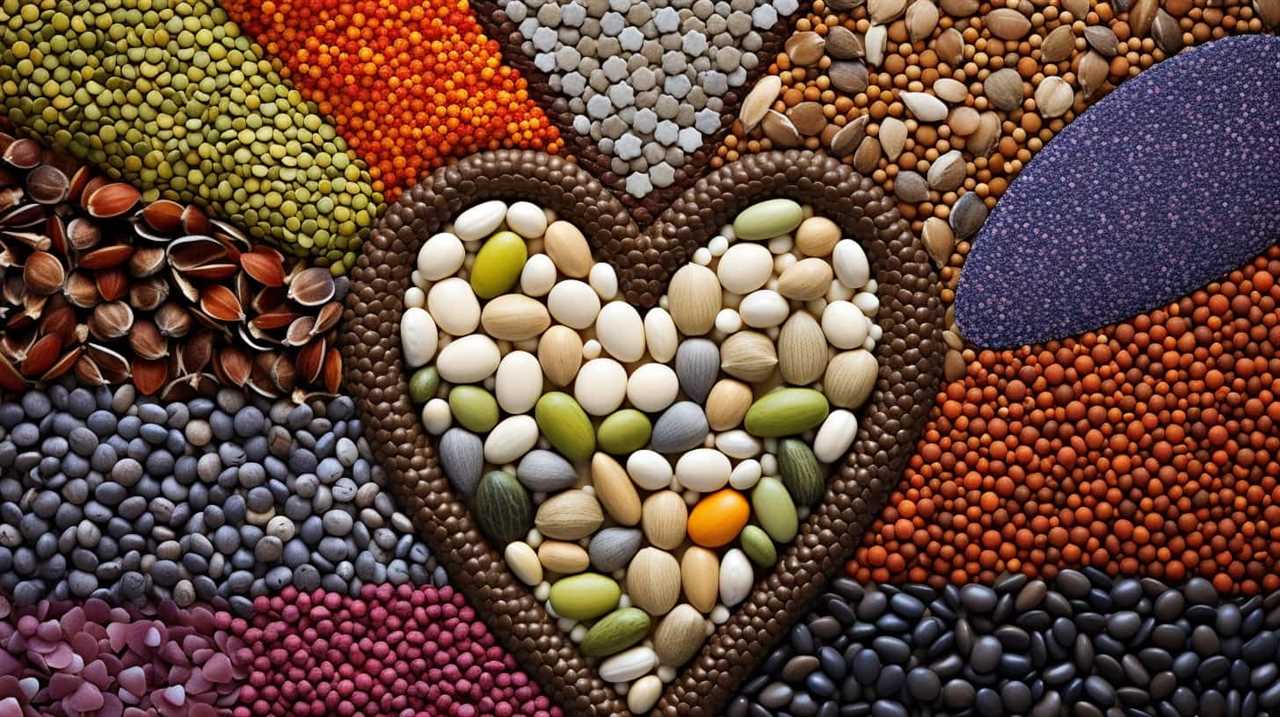
| Seed | Cognitive Benefits |
|---|---|
| Chia Seeds | Improved memory and focus |
| Flaxseeds | Enhanced cognitive function |
| Pumpkin Seeds | Reduced risk of neurodegenerative diseases |
| Sesame Seeds | Improved learning abilities |
| Sunflower Seeds | Increased mental clarity and concentration |
Incorporating these seeds into my vegan meals not only adds texture and flavor but also provides cognitive benefits that contribute to overall brain health and function.
Aids in Detoxification
Seeds play a vital role in aiding my body’s detoxification process by eliminating harmful toxins and promoting overall wellness. Here are three detoxification benefits of incorporating seeds into my vegan meals:
-
Rich in fiber: Seeds such as chia, flax, and hemp are high in fiber, which helps to cleanse the digestive system and promote regular bowel movements. This aids in the elimination of toxins from the body.
-
Packed with antioxidants: Seeds are a great source of antioxidants, which protect the body against free radicals and reduce oxidative stress. This helps to detoxify the body and promote cellular health.
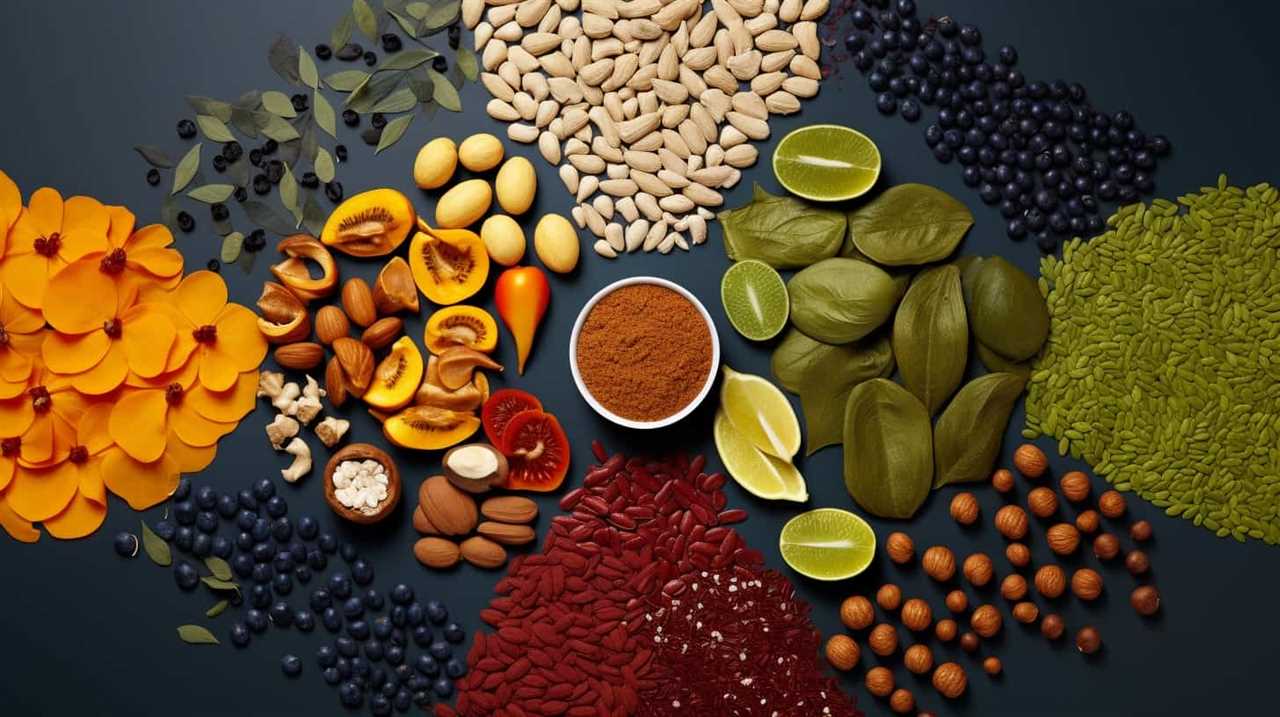
-
Liver support: Many seeds, including milk thistle and dandelion, contain compounds that support liver function. The liver is responsible for detoxifying the body, so incorporating these seeds into my meals can help enhance its detoxification abilities.
To reap the detoxification benefits of seeds, I can try adding them to smoothies, salads, or homemade energy bars. They not only enhance the flavor and texture of my vegan meals but also contribute to my overall well-being.
Frequently Asked Questions
Are All Seeds Equally High in Omega-3 Fatty Acids?
All seeds are not equally high in omega-3 fatty acids. Flaxseeds and chia seeds are excellent sources, while pumpkin and sunflower seeds contain lower amounts. To incorporate seeds in vegan meals, try adding them to smoothies, salads, or homemade granola.
Can Incorporating Seeds in Vegan Meals Help With Weight Loss?
Incorporating seeds in vegan meals can aid weight loss. Seeds provide essential nutrients, fiber, and healthy fats, keeping you fuller for longer. Athletes can benefit from seeds for muscle gain and incorporating them in plant-based diets.
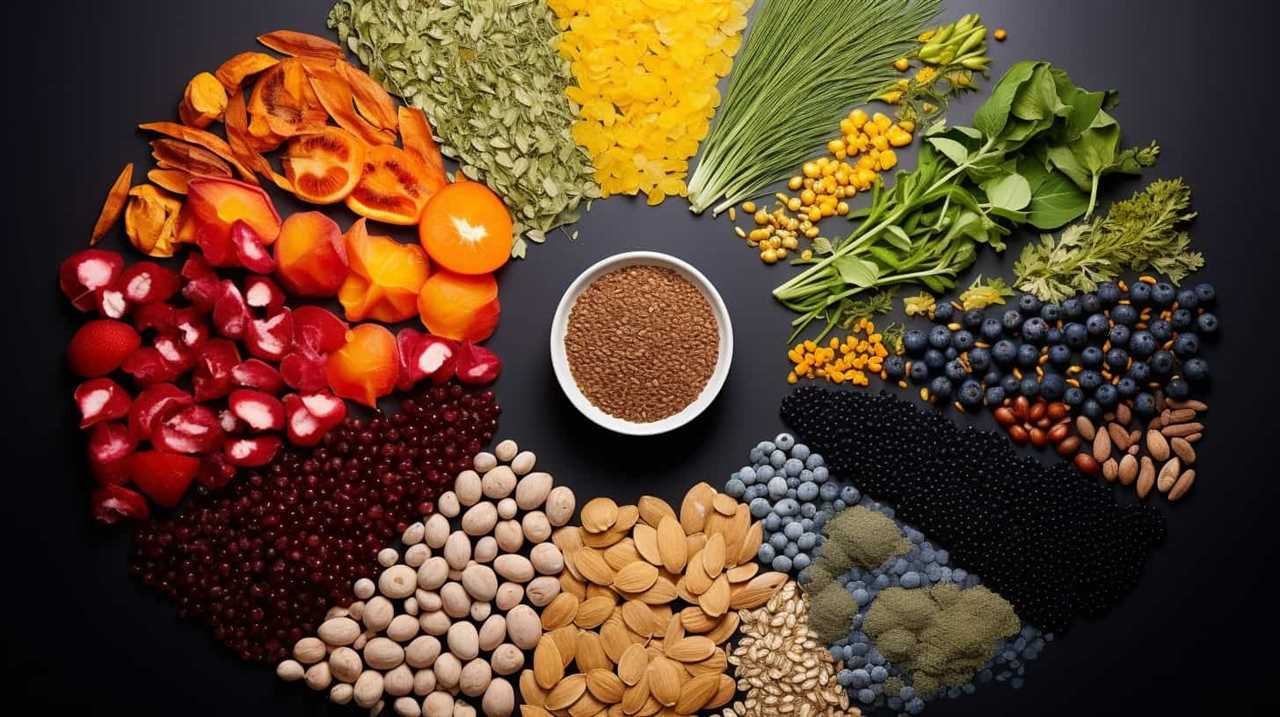
How Do Seeds Promote Skin and Hair Health?
Incorporating seeds into vegan meals contributes to overall health and well-being. They promote skin and hair health by providing essential nutrients like omega-3 fatty acids and vitamins. Get creative with recipes to maximize the benefits!
Which Seeds Are the Best for Improving Brain Function?
When it comes to improving brain function, the best seeds for memory and cognitive function are flaxseeds, chia seeds, and pumpkin seeds. These seeds are rich in omega-3 fatty acids, antioxidants, and nutrients that support brain health.
Can Incorporating Seeds in Vegan Meals Help With Detoxification?
Incorporating seeds in vegan meals can aid in digestion and gut health by providing fiber and essential nutrients. Additionally, they have anti-inflammatory properties, which can help reduce inflammation in the body.
Conclusion
Incorporating seeds into vegan meals offers a range of benefits for overall health and well-being. Not only are they a rich source of omega-3 fatty acids and fiber, but they also boost heart health, support weight management, and improve brain function.

One interesting statistic is that incorporating just one tablespoon of chia seeds into your diet can provide 5 grams of fiber, which is 20% of the recommended daily intake.
So why not sprinkle some seeds on your next vegan meal and reap the rewards of their nutritional goodness?
Hi, I’m Sarah. I write for Turtle Tree Seeds, a news blog that loves food – all kinds of food. But especially bacon, chocolate, and veggies. We’re on a mission to show the world that you can enjoy all of those things, even kale and brussels sprouts. Because we believe that when it comes to food, there’s no such thing as guilty pleasures. Just pleasures.
I’m also a huge fan of puns (obviously).
Chia Seeds in Vegan Diet
11 Essential Tips for Using Seeds in Vegan Recipes

Hi there!
Looking to add some plant-based goodness to your vegan recipes? Well, let me spill the seeds of wisdom. In this article, I’ll share my top 11 essential tips for using seeds in your culinary creations.
From chia seeds as an egg replacer to making nutritious chia seed pudding, we’ve got you covered.
So get ready to elevate your vegan cooking game with these helpful tips. Let’s dive in and unlock the potential of seeds for your kitchen adventures!

Key Takeaways
- Incorporate a variety of seeds, such as chia, flax, and hemp, to maximize nutritional benefits.
- Use seeds as toppings for salads, yogurt, or oatmeal to add texture and flavor.
- Grind seeds into a powder to use as a substitute for eggs in baking recipes.
- Sprinkle seeds onto roasted vegetables for added crunch and nutritional value.
Soak Chia Seeds Before Using
Before using chia seeds in vegan recipes, I always make sure to soak them. This simple step is crucial for unlocking the many benefits of chia seeds.
Soaking chia seeds in water or plant-based milk helps to enhance their digestibility and nutrient absorption. When soaked, chia seeds form a gel-like consistency that can be used as a binding agent in various recipes. This gel also adds moisture and texture to baked goods, making them moist and fluffy.
Soaking chia seeds also increases their antioxidant content, which can help reduce inflammation in the body. Incorporating soaked chia seeds into your vegan dishes is a great way to boost their nutritional value and add a satisfying texture.
From smoothies and puddings to breads and muffins, there are countless chia seed recipes to explore. So, don’t forget to soak your chia seeds before using them to truly experience their benefits in your vegan creations.
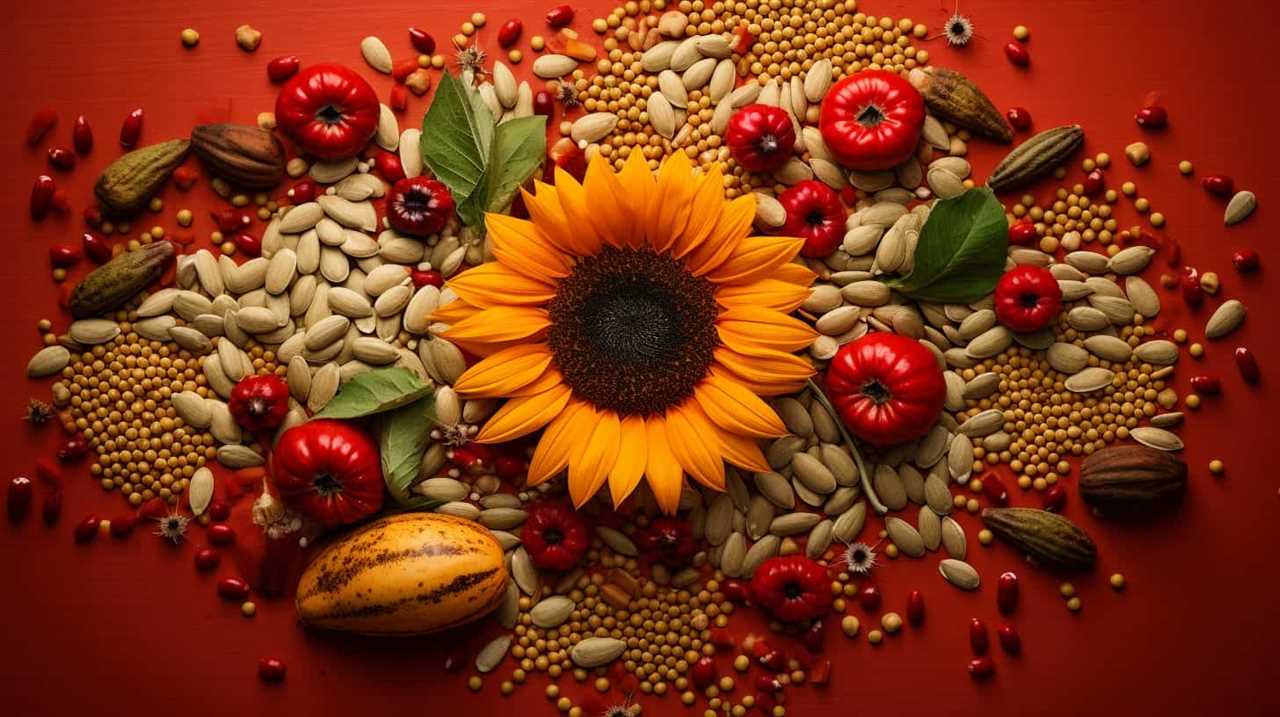
Use Chia Seeds as an Egg Replacement
When it comes to vegan baking, finding a suitable egg replacement is crucial. Chia seeds are an excellent option to consider. They’re rich in fiber, omega-3 fatty acids, and protein, making them a nutritious substitute for eggs.
Unlike flax seeds, chia seeds don’t require grinding before use, making them even more convenient in recipes.
Additionally, there are other egg substitute options available for those with allergies or dietary restrictions.
Chia Vs. Flax: Differences
I prefer using chia seeds as an egg replacement in vegan recipes due to their unique properties and versatility. When comparing chia seeds to flax seeds, it’s important to consider their nutritional profiles and best uses.
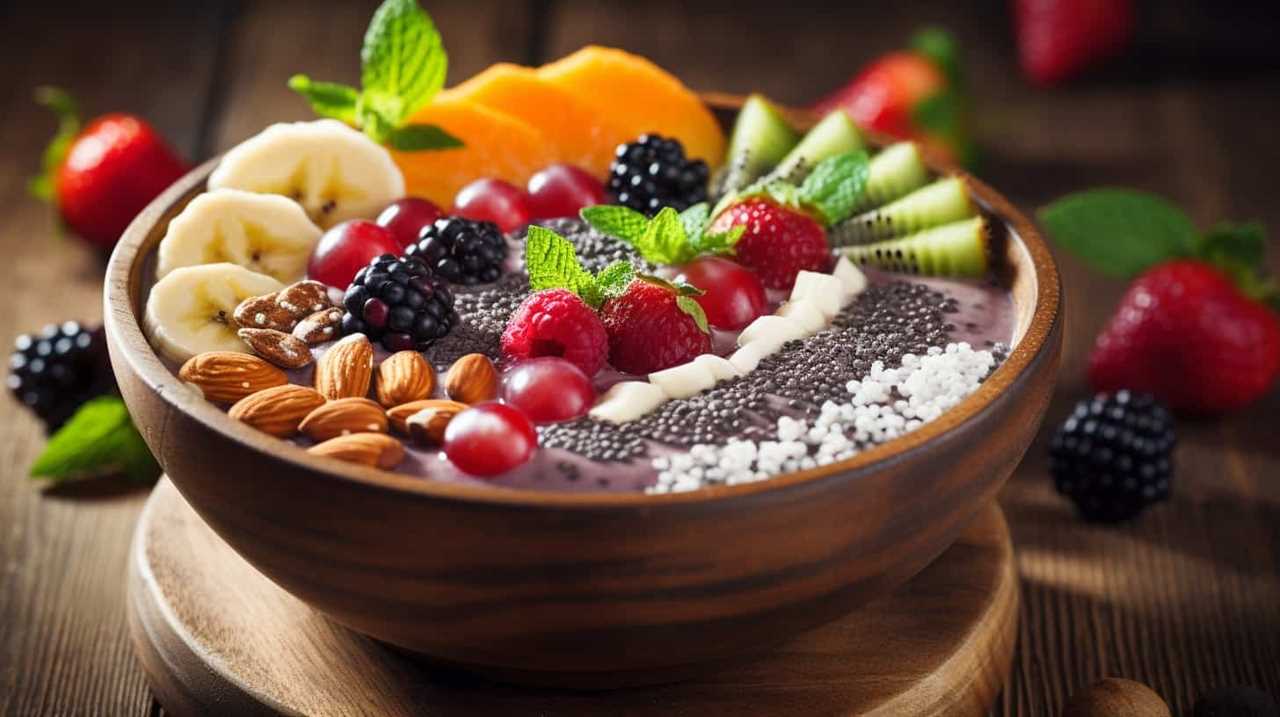
Here are three key differences between chia seeds and flax seeds:
-
Omega-3 fatty acids: Chia seeds contain more omega-3s than flax seeds, making them a great choice for promoting heart health and reducing inflammation.
-
Fiber content: Chia seeds have a higher fiber content than flax seeds, which can aid in digestion and help regulate blood sugar levels.
-
Gel-forming ability: Chia seeds have a remarkable ability to absorb liquid and form a gel-like substance, making them an excellent option for binding ingredients together in recipes.
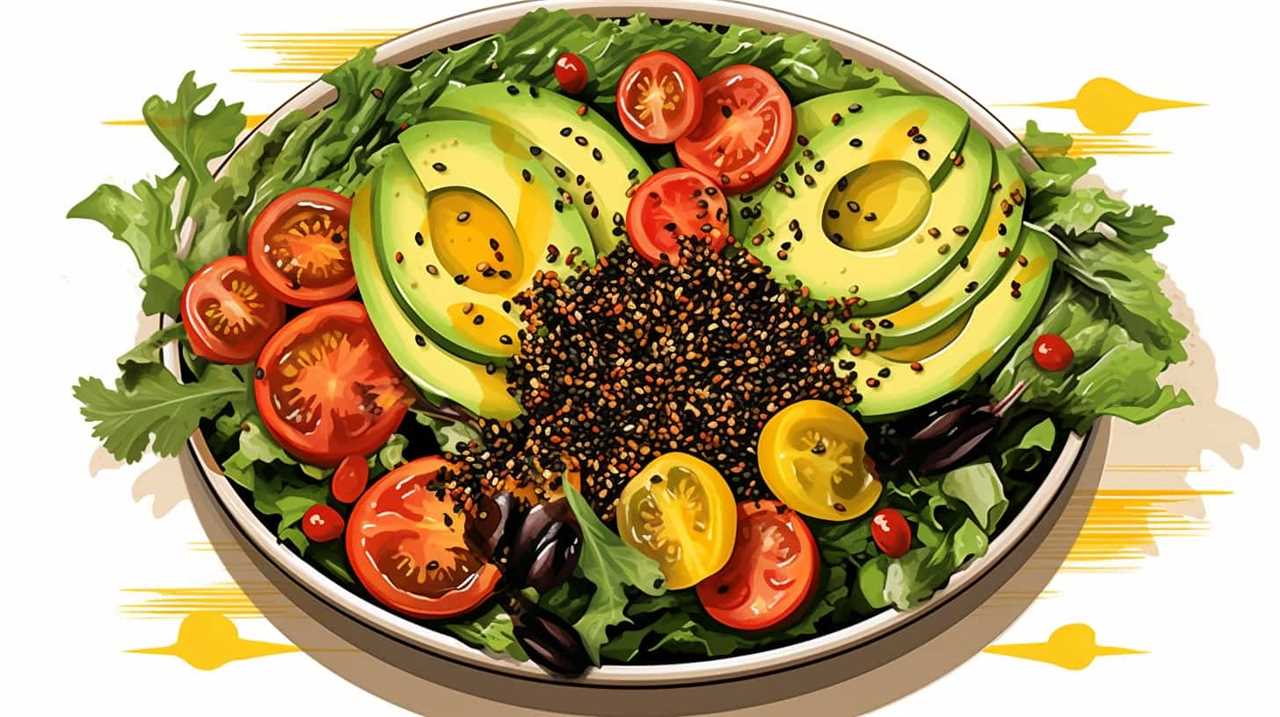
Now that we’ve explored the differences between chia and flax seeds, let’s move on to other egg substitute options.
Other Egg Substitute Options?
Another option for replacing eggs in vegan recipes is using chia seeds as an egg substitute. Chia seeds are a versatile ingredient that can be used in various recipes to provide the binding and thickening properties typically associated with eggs.
To use chia seeds as an egg substitute, simply combine one tablespoon of chia seeds with three tablespoons of water and let it sit for about 10 minutes until it forms a gel-like consistency. This chia gel can then be used as a substitute for one egg in your recipe.
The benefits of using chia seeds as an egg substitute include their high nutritional value, as they’re rich in omega-3 fatty acids, fiber, and protein. Additionally, chia seeds are gluten-free and can add a subtle crunch to your dishes.

Make Chia Seed Pudding for a Nutritious Dessert
To create a nutritious dessert, I recommend making chia seed pudding. Chia seeds are packed with nutrients like fiber, omega-3 fatty acids, and antioxidants, making them a great addition to any vegan diet.
Here are three reasons why chia seed pudding is a fantastic choice for a healthy and indulgent treat:
-
Versatility: Chia seed pudding can be customized to suit your taste preferences. You can experiment with different flavors by adding fruits, nuts, or spices like cinnamon or cocoa powder. You can even use chia seed smoothie recipes as a base for your pudding, creating a creamy and delicious dessert.
-
Easy to make: Making chia seed pudding is incredibly simple. All you need to do is mix chia seeds with your choice of liquid (such as almond milk or coconut milk) and let it sit in the fridge overnight. The chia seeds will absorb the liquid and create a thick, pudding-like consistency.
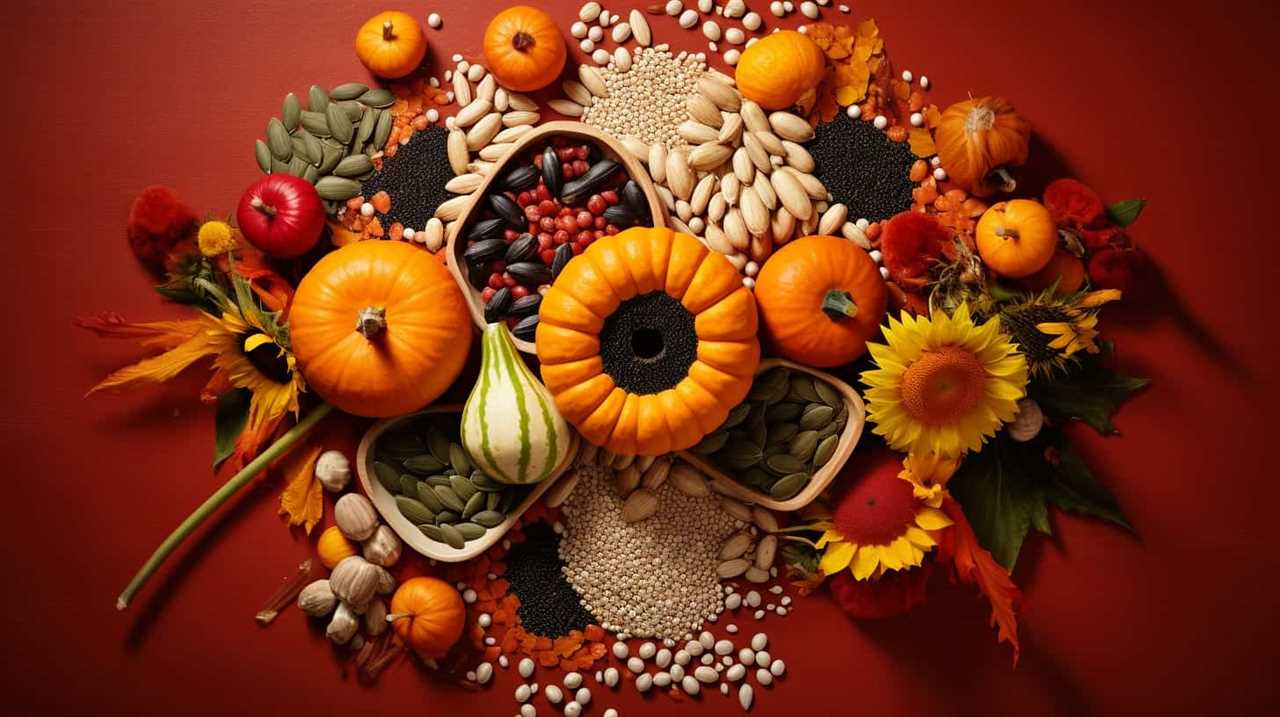
-
Nutritional benefits: Chia seeds are a nutritional powerhouse. They’re rich in fiber, which helps with digestion and promotes a feeling of fullness. They also contain omega-3 fatty acids, which are beneficial for heart health. By enjoying chia seed pudding, you can satisfy your sweet tooth while nourishing your body with essential nutrients.
Add Chia Seeds to Smoothies for Extra Fiber
Adding chia seeds to smoothies is a simple and effective way to boost their nutritional value.
Not only do chia seeds provide extra fiber, but they also offer a host of other health benefits such as omega-3 fatty acids and antioxidants.
Boost Smoothie Nutrition
I love adding chia seeds to my smoothies for an extra boost of fiber. Not only do they add a lovely texture, but they also provide numerous health benefits. Here are three reasons why you should consider adding chia seeds to your smoothies:
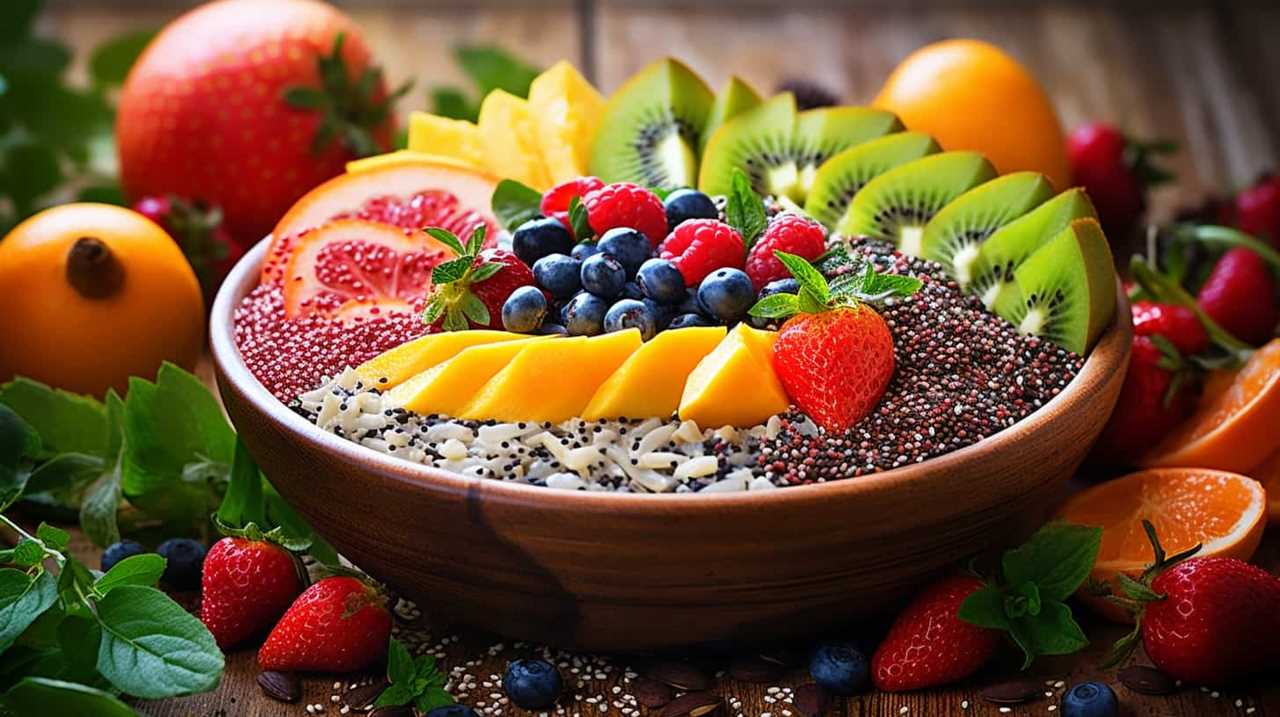
-
Boost smoothie flavors: Chia seeds are a great way to enhance the taste of your smoothies. They have a mild, nutty flavor that complements a wide range of ingredients. Whether you’re making a fruity or a green smoothie, chia seeds can add a subtle richness that takes the flavor to the next level.
-
Increase fiber intake: Chia seeds are an excellent source of dietary fiber. Just one tablespoon of chia seeds contains around five grams of fiber, which is about 20% of the recommended daily intake. Adding chia seeds to your smoothies can help improve digestion, promote feelings of fullness, and support overall gut health.
-
Provide essential nutrients: Chia seeds are packed with essential nutrients like omega-3 fatty acids, antioxidants, and minerals. These nutrients can help reduce inflammation, support brain health, and boost your immune system. By incorporating chia seeds into your smoothies, you’ll be giving your body a nutritious and delicious treat.
Increase Dietary Fiber
Chia seeds can significantly increase the dietary fiber content of your smoothies, providing numerous health benefits. Not only are chia seeds packed with fiber, but they also promote gut health by acting as prebiotics, nourishing the beneficial bacteria in your gut.

To incorporate chia seeds into your smoothies, simply add a tablespoon or two to your favorite recipe. They’ll blend seamlessly, adding a subtle crunch and a boost of fiber.
Chia seeds can also be used creatively in baking. Try replacing eggs with a chia seed gel (mix 1 tablespoon of chia seeds with 3 tablespoons of water and let it sit for 15 minutes) to add fiber to your baked goods.
Next, let’s explore how chia seeds can be used as a thickening agent in sauces and dressings.
Use Chia Seeds as a Thickening Agent in Sauces and Dressings
Chia seeds can be a versatile thickening agent for sauces and dressings in vegan recipes. Not only do they add a gel-like consistency, but they also bring a host of health benefits. Here are three creative ways to use chia seeds as a thickening agent:
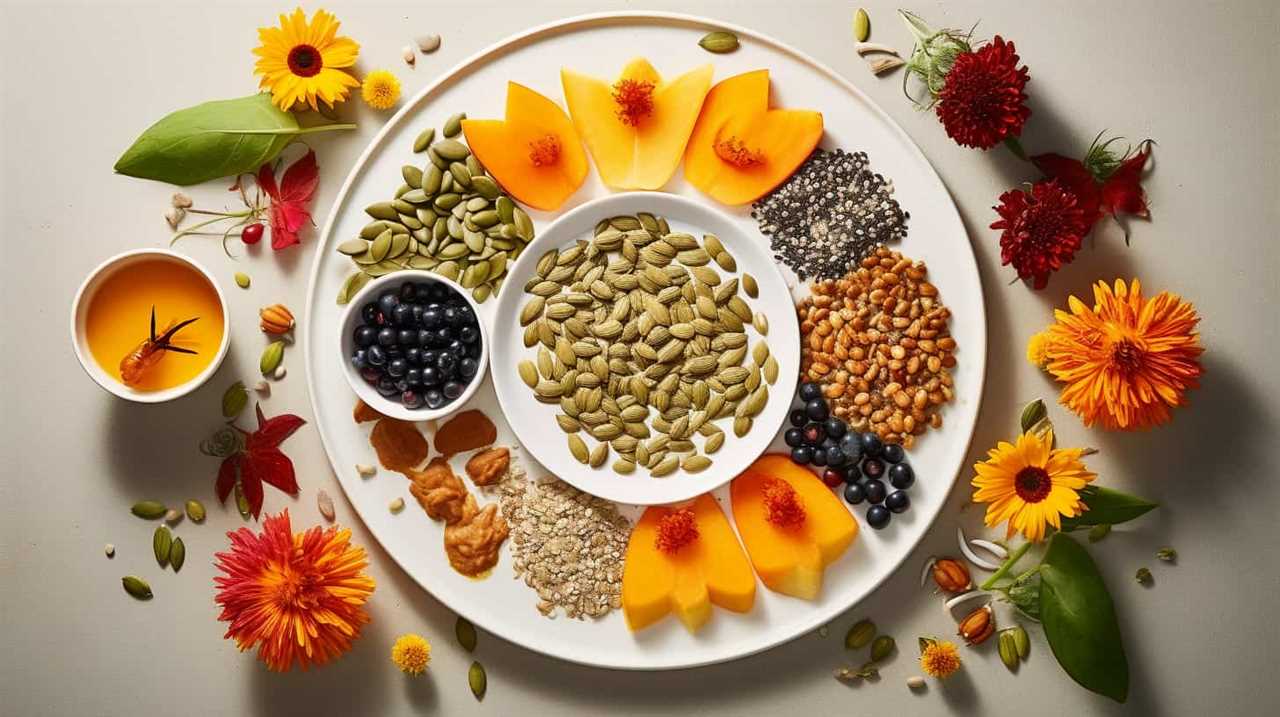
-
Make a chia seed gel: Mix chia seeds with water and let it sit for about 10 minutes until it forms a gel-like texture. Add this gel to your sauces or dressings to thicken them naturally.
-
Blend chia seeds: Grind chia seeds into a fine powder using a blender or coffee grinder. This powder can be added to your recipes, acting as a thickening agent without altering the taste.
-
Combine chia seeds with liquids: Mix chia seeds with water, plant-based milk, or vegetable broth to create a thickening base for your sauces and dressings.
Incorporate Chia Seeds Into Homemade Energy Bars
I love incorporating chia seeds into my homemade energy bars because they add a nutritional boost and a satisfying crunch. Chia seeds are packed with fiber, omega-3 fatty acids, and antioxidants, making them a great addition to any vegan recipe.
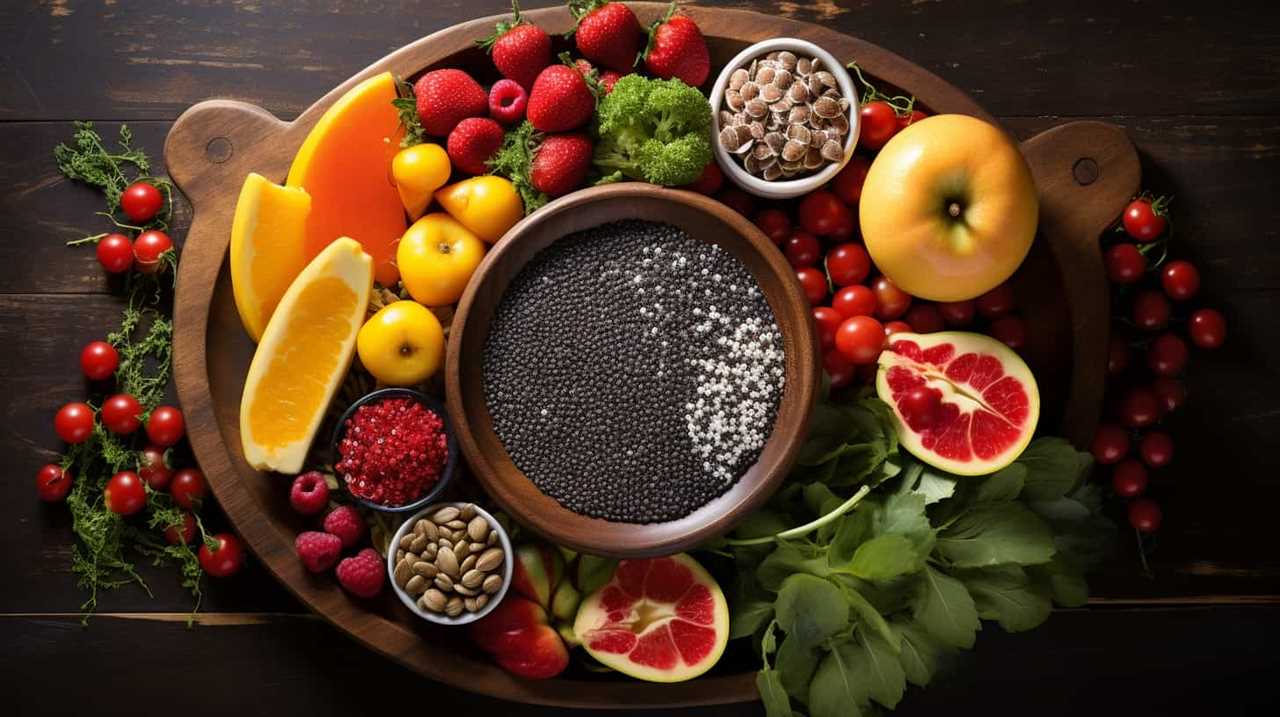
Not only do they provide a healthy dose of nutrients, but they also help bind the ingredients together, creating a perfect texture for energy bars. If you don’t have chia seeds on hand, you can try substituting flaxseeds or hemp seeds for a similar nutritional profile.
Benefits of Chia Seeds
One of the key advantages of incorporating chia seeds into my homemade energy bars is their abundant nutritional benefits. Chia seeds are a powerhouse of nutrients, packed with essential vitamins, minerals, and antioxidants.
Here are three reasons why I love using chia seeds in my baked goods:
-
High in Omega-3 Fatty Acids: Chia seeds are one of the best plant-based sources of omega-3 fatty acids, which are important for heart health and reducing inflammation.
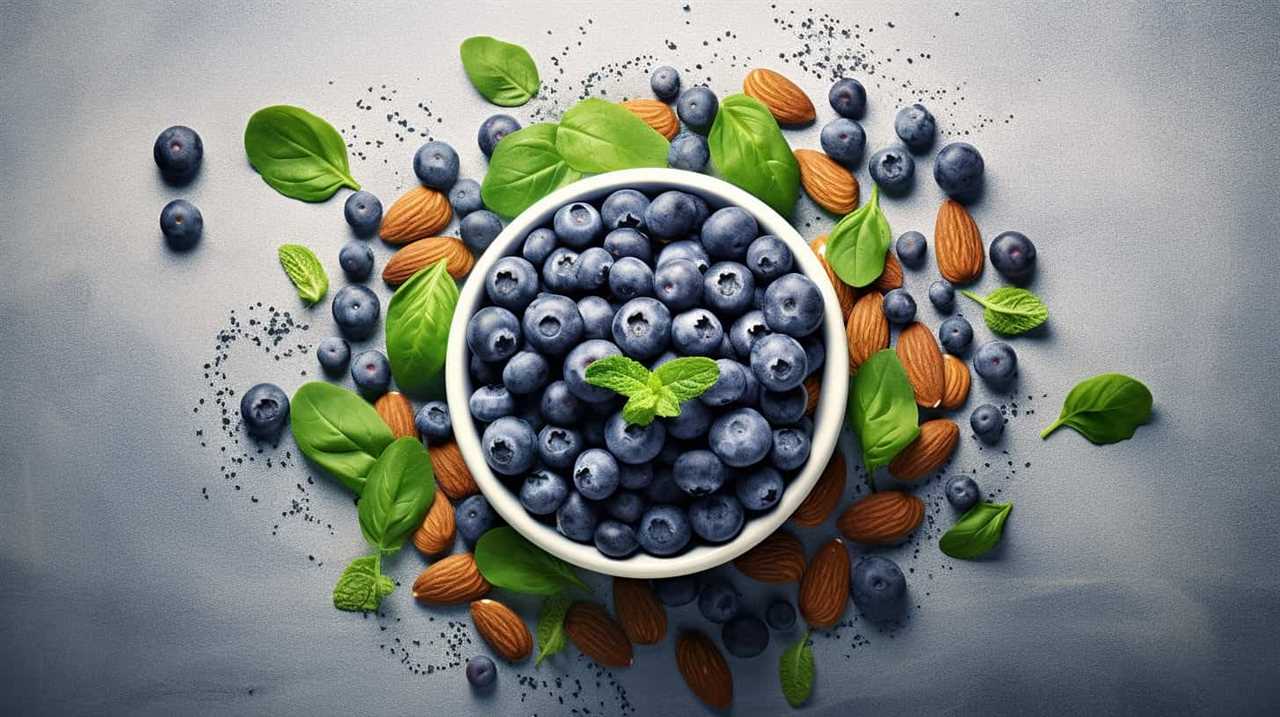
-
Rich in Fiber: Chia seeds are an excellent source of dietary fiber, which helps promote digestion, regulate blood sugar levels, and keep you feeling full and satisfied.
-
Packed with Protein: Chia seeds are a great plant-based protein source, making them an ideal ingredient for energy bars. Protein is essential for building and repairing tissues, supporting muscle growth, and helping to keep you feeling energized throughout the day.
Energy Bar Recipe Ideas
To create delicious and nutritious energy bars that incorporate the benefits of chia seeds, start by experimenting with different recipe ideas.
Energy bars are a convenient and portable snack that can provide a quick burst of energy during the day. Incorporating chia seeds into homemade energy bars not only adds a nutritional boost but also enhances the texture and flavor. Chia seeds are packed with fiber, protein, and omega-3 fatty acids, making them a valuable ingredient in vegan baking.
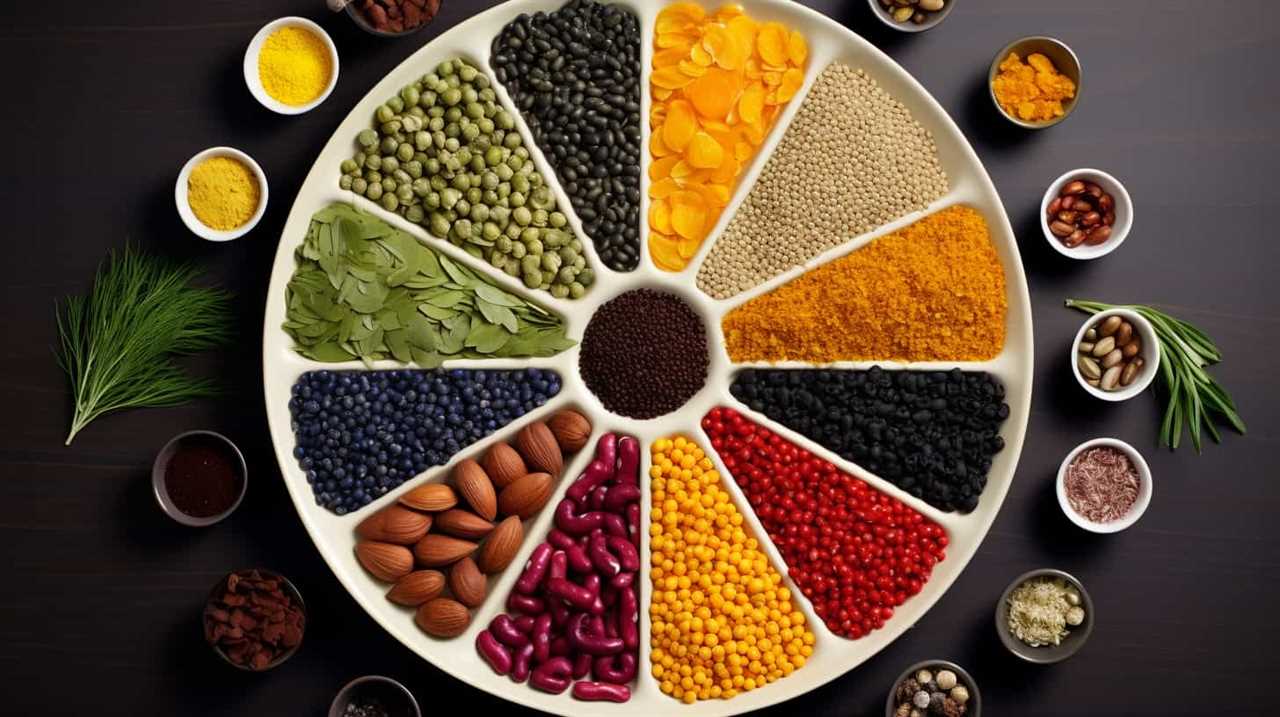
When it comes to flavor variations, the possibilities are endless. You can try adding ingredients like dried fruits, nuts, chocolate chips, or even spices like cinnamon or ginger. Get creative and find the combination that suits your taste buds.
In the next section, we’ll explore some substitutes for chia seeds that can be used in vegan recipes.
Substitutes for Chia Seeds
I love experimenting with different ingredients to incorporate the nutritional benefits of chia seeds into my homemade energy bars. However, if you don’t have chia seeds on hand or simply want to try something different, there are several chia seed alternatives that you can use.
Here are three options to consider:

-
Flaxseeds: Like chia seeds, flaxseeds are rich in omega-3 fatty acids and fiber. They can provide a similar nutritional boost to your energy bars. To use flaxseeds as a substitute for chia seeds, simply grind them into a fine powder and use them in the same quantities as the chia seeds called for in your recipe.
-
Hemp seeds: Hemp seeds are a great source of plant-based protein and contain all nine essential amino acids. They also provide a good amount of omega-3 fatty acids. To incorporate hemp seeds into your energy bars, use them in the same quantities as chia seeds.
-
Sunflower seeds: While sunflower seeds don’t offer the same omega-3 content as chia seeds, they’re still a nutritious option. They’re high in vitamin E, magnesium, and selenium. To substitute sunflower seeds for chia seeds, grind them into a coarse powder and use them in equal amounts.
Sprinkle Chia Seeds on Top of Salads for a Crunchy Texture
To achieve a crunchy texture, I recommend sprinkling chia seeds on top of salads in vegan recipes. Chia seeds aren’t only packed with nutrients, but they also add a delightful crunch to your salads. If you’re looking for other crunchy salad toppings, consider options like pumpkin seeds, sliced almonds, or crispy chickpeas.
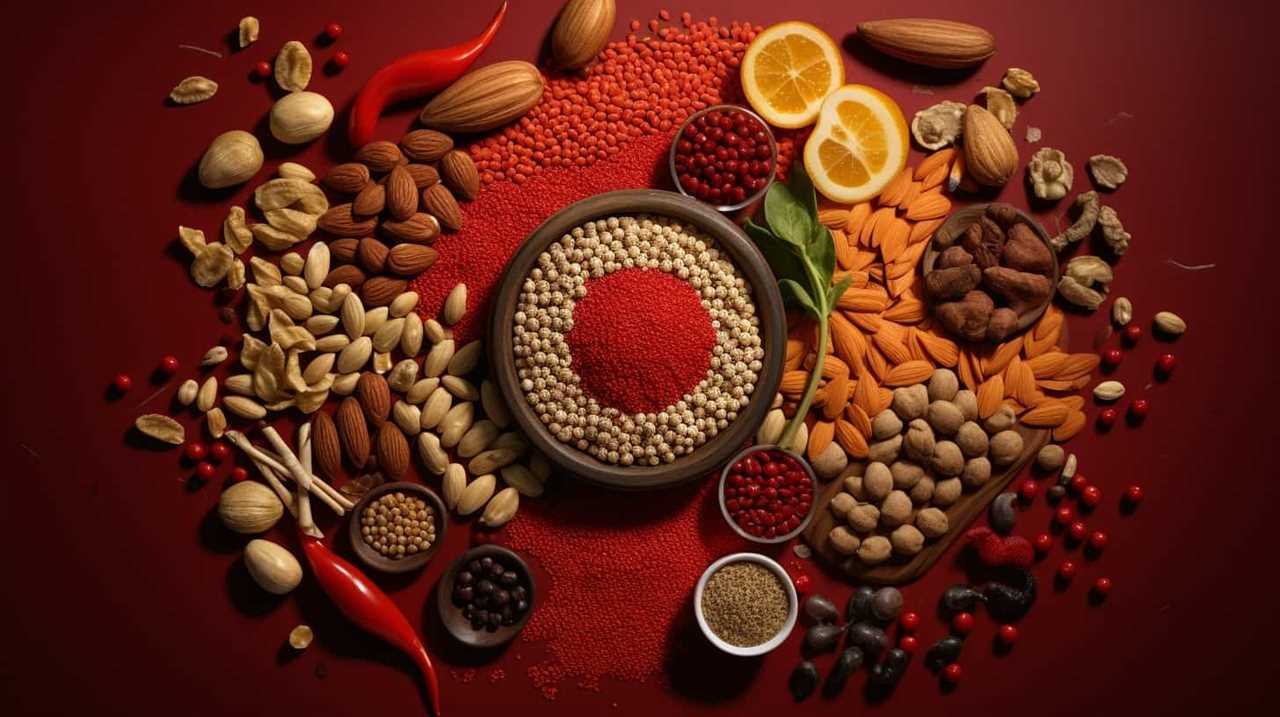
However, chia seeds stand out due to their unique health benefits. These tiny seeds are loaded with fiber, omega-3 fatty acids, and antioxidants, which can support digestion, heart health, and overall well-being. By sprinkling a tablespoon or two of chia seeds on your salads, you can enhance both the texture and nutritional value of your meal.
Now, let’s move on to another way to incorporate chia seeds into your vegan recipes – mixing them into homemade granola for added nutrition.
Mix Chia Seeds Into Homemade Granola for Added Nutrition
Mixing chia seeds into homemade granola provides added nutrition and enhances the taste and texture. Chia seeds are a versatile ingredient that can be incorporated into various recipes, including baking. Here are three reasons why you should consider adding chia seeds to your homemade granola:
-
Nutritional powerhouse: Chia seeds are packed with essential nutrients like fiber, protein, omega-3 fatty acids, and antioxidants. By adding them to your granola, you can boost its nutritional profile and support your overall health.

-
Weight loss aid: Chia seeds are known for their ability to promote weight loss. They’re high in fiber, which can help you feel full and satisfied, reducing the chances of overeating. Incorporating chia seeds into your granola can be a delicious and healthy addition to your weight loss journey.
-
Crunchy texture: Chia seeds add a delightful crunch to your homemade granola. When mixed with other ingredients like oats, nuts, and dried fruits, they create a satisfying texture that makes your granola even more enjoyable.
Use Chia Seeds as a Binding Agent in Veggie Burgers and Meatballs
Adding chia seeds as a binding agent in veggie burgers and meatballs enhances their texture and helps hold them together during cooking. Chia seeds are a great alternative to eggs or breadcrumbs for binding plant-based dishes. Not only do they provide a vegan-friendly option, but they also offer numerous health benefits.
Chia seeds are rich in omega-3 fatty acids, fiber, and protein, making them a nutritious addition to your meals. To use chia seeds as a binding agent, simply mix them with water to create a gel-like consistency. This gel will help hold your veggie burgers and meatballs together, preventing them from falling apart during cooking.
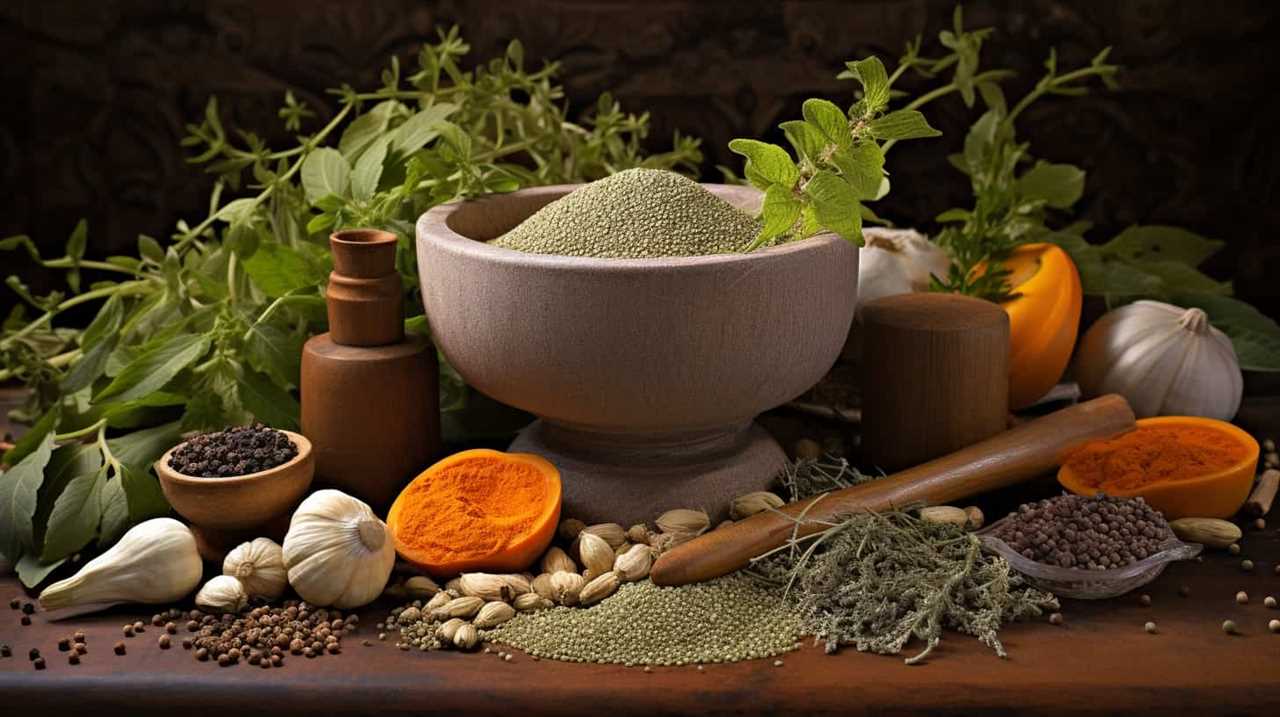
Experiment with different chia seed recipes to find the perfect combination of flavors and textures for your plant-based creations. Enjoy the benefits of chia seeds while indulging in delicious and wholesome meals.
Make Chia Seed Jam for a Healthier Alternative to Traditional Spreads
For a healthier alternative to traditional spreads, I love making chia seed jam using fresh fruits and a time-saving food processor. Chia seed jam isn’t only delicious but also packed with nutritional benefits.
Here are three reasons why you should try making chia seed jam:
-
Rich in Omega-3 fatty acids: Chia seeds are a great source of omega-3 fatty acids, which are essential for brain health, reducing inflammation, and supporting heart health.

-
High in fiber: Chia seeds are an excellent source of dietary fiber, promoting healthy digestion and keeping you feeling full and satisfied. This can be especially beneficial for those following a plant-based diet.
-
Versatile and customizable: Chia seed jam can be made with a variety of fruits, allowing you to experiment with different flavors. From classic strawberry to exotic mango, the possibilities are endless.
To make chia seed jam, simply blend your favorite fruit with chia seeds and a sweetener of your choice in a food processor. Let it sit for a few hours or overnight, and you’ll have a delicious spread ready to enjoy on toast, pancakes, or even as a topping for yogurt. Get creative and have fun with different combinations to find your favorite chia seed jam recipe variation.
Blend Chia Seeds Into Homemade Nut Milk for Added Creaminess
I love using chia seeds to blend into homemade nut milk for added creaminess. Chia seeds are a fantastic ingredient to incorporate into your vegan recipes, not only for their nutritional benefits but also for their ability to enhance the texture and taste of your dishes.

When it comes to making nut milk, chia seeds can be a game-changer. Simply soak the chia seeds in water or your choice of plant-based milk, and they’ll expand and create a thick, creamy consistency. This makes the nut milk richer and more indulgent, perfect for adding to your morning coffee, cereal, or even for baking.
You can also blend chia seeds into smoothie bowls for an extra boost of fiber and omega-3 fatty acids. So, go ahead and experiment with chia seeds in your homemade nut milk and smoothie bowls to achieve that luxurious creaminess you desire.
Frequently Asked Questions
Can You Eat Chia Seeds Without Soaking Them First?
Yes, you can eat chia seeds without soaking them first. However, soaking them in liquid helps to enhance their nutritional value and makes them easier to digest. Soaking chia seeds also allows them to release their gel-like texture, which can be beneficial in recipes.
How Much Chia Seeds Should I Use as an Egg Replacement in Recipes?
I usually use 1 tablespoon of chia seeds mixed with 3 tablespoons of water as an egg replacement in recipes. Chia seeds have many benefits, like being a good source of omega-3s and fiber. Other egg replacements include mashed banana or applesauce.
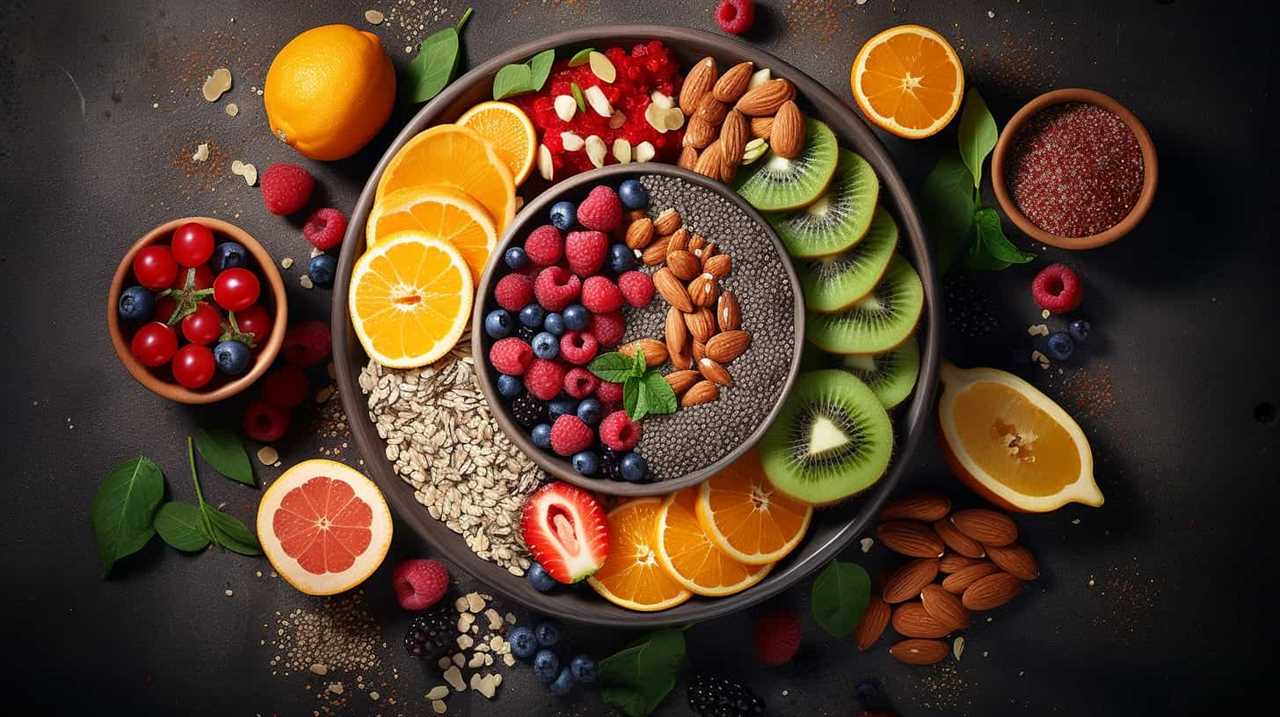
Is Chia Seed Pudding Suitable for Those With Nut Allergies?
Yes, chia seed pudding is suitable for those with nut allergies. It’s a delicious and nutritious breakfast option. There are also variations of chia seed pudding to accommodate different dietary needs. Enjoy!
Can I Use Chia Seeds as a Thickening Agent in Both Hot and Cold Sauces?
Yes, you can use chia seeds as a thickening agent in both hot and cold sauces. They work well as a binding agent in baking and can be a great substitute for gelatin in desserts.
Are There Any Potential Side Effects of Consuming Chia Seeds in Large Quantities?
In large quantities, potential long term effects of consuming chia seeds should be considered. To maintain freshness and nutritional value, store chia seeds properly. It’s important to be informed and practical when using these seeds in vegan recipes.
Conclusion
In conclusion, incorporating seeds into vegan recipes can be both nutritious and delicious. From chia seeds as an egg replacement to adding them to smoothies for extra fiber, the possibilities are endless.
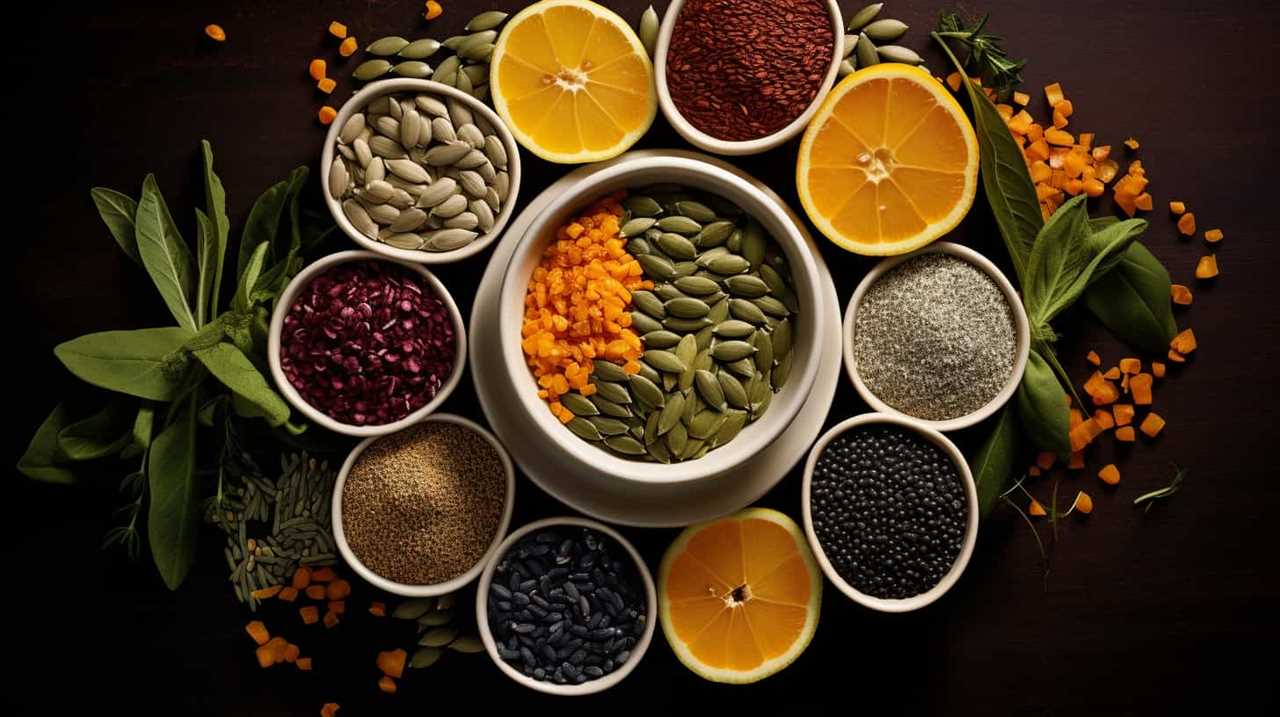
So go ahead and get creative in the kitchen with these essential tips. You’ll be amazed at the incredible flavors and health benefits that seeds can bring to your plant-based meals.
Happy cooking!
Hi, I’m Sarah. I write for Turtle Tree Seeds, a news blog that loves food – all kinds of food. But especially bacon, chocolate, and veggies. We’re on a mission to show the world that you can enjoy all of those things, even kale and brussels sprouts. Because we believe that when it comes to food, there’s no such thing as guilty pleasures. Just pleasures.
I’m also a huge fan of puns (obviously).
Chia Seeds in Vegan Diet
12 Tips: Maximizing Protein From Vegan-Friendly Seeds

I am here to share with you 12 excellent methods for boosting your protein intake by incorporating vegan-friendly seeds.
Trust me, these little powerhouses are a game-changer for anyone following a plant-based lifestyle.
From the almighty chia seeds to other nutritious options, we’ll explore the protein content, nutritional profile, and ways to incorporate them into your meals.
Get ready to fuel your body with sustainable and delicious protein sources that will leave you feeling energized and liberated.

Let’s dive in!
Key Takeaways
- Chia seeds are a valuable source of protein for vegans, containing all nine essential amino acids.
- Chia seeds can be easily incorporated into various meals, such as smoothies, pudding, and salad dressings, to boost protein and fiber intake.
- Soaking chia seeds in water or plant-based milk and grinding them into a powder can enhance their digestibility and bioavailability.
- Choosing chia seeds as a protein option aligns with the values of a vegan lifestyle, while also providing water conservation benefits and reducing the carbon footprint.
Importance of Chia Seeds in Vegan Diet
The inclusion of chia seeds in my vegan diet has proven to be essential for maximizing protein intake. Chia seeds are a powerhouse of nutrients, packed with protein content that’s crucial for maintaining a healthy vegan lifestyle.
These tiny seeds are an excellent source of plant-based protein, containing all nine essential amino acids that our bodies need. In fact, chia seeds contain more protein per gram than most other plant-based sources.
Not only do they provide a high protein content, but chia seeds also offer numerous health benefits. They’re rich in antioxidants, fiber, and omega-3 fatty acids, which can promote heart health, improve digestion, and support brain function.
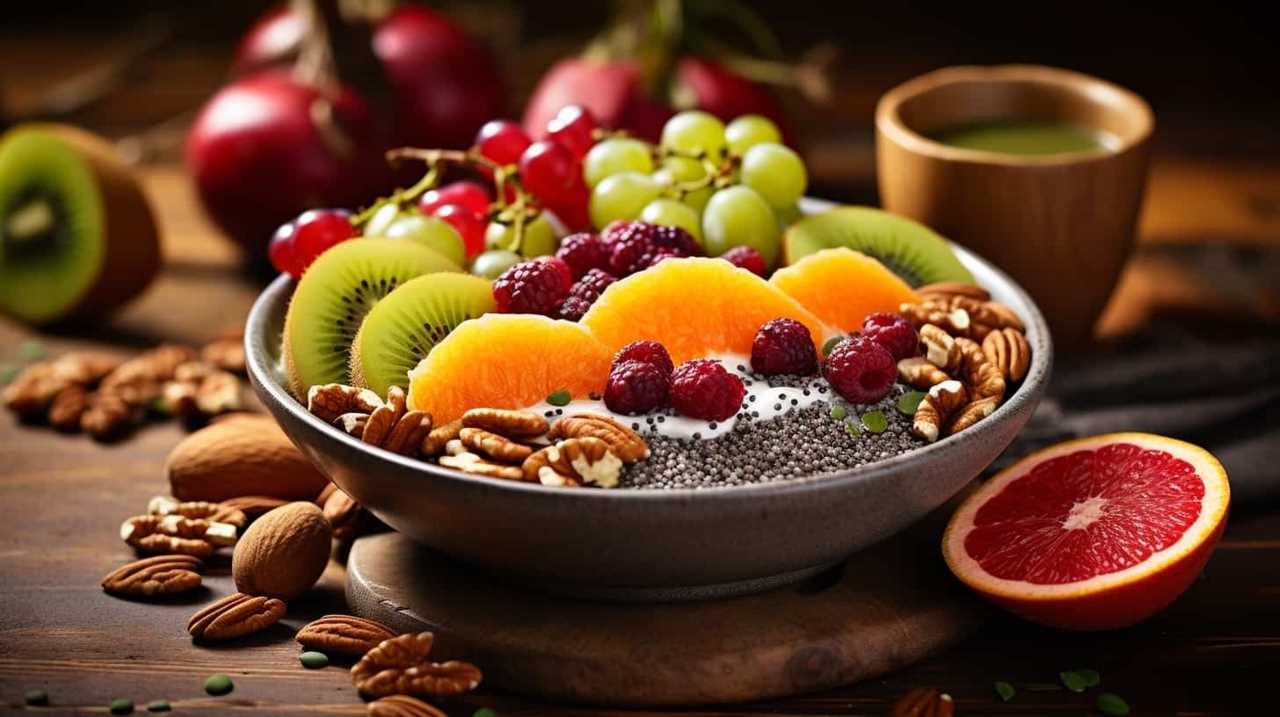
Incorporating chia seeds into my vegan diet has been a game-changer, ensuring that I meet my protein needs while reaping the many health benefits they offer.
Protein Content of Chia Seeds for Vegans
How much protein do chia seeds provide for vegans looking to maximize their intake? Chia seeds are a great source of plant-based protein, making them an excellent addition to a vegan diet. Here are four key points about the protein content of chia seeds:
-
Protein-packed snack: Chia seeds contain approximately 6 grams of protein per ounce. This makes them a protein-packed vegan snack option, perfect for those looking to increase their protein intake.
-
Complete protein: Chia seeds are considered a complete protein, meaning they contain all nine essential amino acids that our bodies need. This makes them a valuable protein source for vegans.
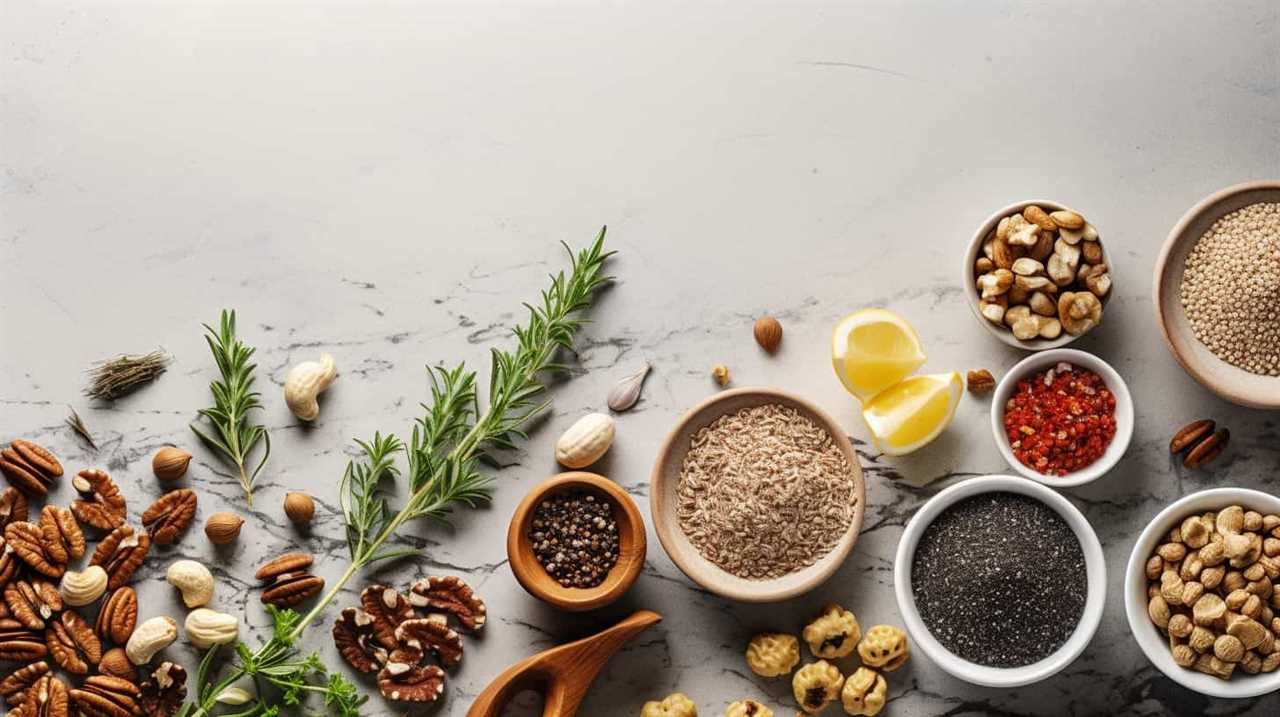
-
Benefits for weight loss: Chia seeds aren’t only high in protein but also rich in fiber. This combination can help promote feelings of fullness and aid in weight loss efforts.
-
Versatile ingredient: Chia seeds can be easily incorporated into various recipes, such as smoothies, puddings, and baked goods. This versatility makes it convenient to boost your protein intake with chia seeds.
Nutritional Profile of Chia Seeds
Since chia seeds are known for their protein content, it’s important to explore their overall nutritional profile. Chia seeds aren’t only a great source of protein, but they also offer many other health benefits. These tiny seeds are packed with essential nutrients such as omega-3 fatty acids, fiber, calcium, and antioxidants.
The omega-3 fatty acids found in chia seeds contribute to healthy hair by reducing inflammation and promoting scalp health. Additionally, chia seeds can aid in weight loss due to their high fiber content, which can help you feel full and satisfied for longer periods.

Incorporating chia seeds into your diet can provide numerous nutritional benefits, including improved hair health and support for weight loss goals.
Incorporating Chia Seeds Into Meals
To incorporate chia seeds into my meals, I start by adding a tablespoon of them to my morning smoothie. This not only adds a boost of protein and fiber, but also helps to thicken the smoothie and make it more filling.
But chia seeds can be used in so many other ways too. Here are four creative ways to incorporate chia seeds into your meals:
-
Chia seeds in baking: Replace eggs in baking recipes by mixing 1 tablespoon of chia seeds with 3 tablespoons of water per egg. This creates a gel-like consistency that works as a binding agent.

-
Chia pudding: Mix chia seeds with your favorite plant-based milk and let it sit in the fridge overnight. In the morning, you’ll have a delicious and nutritious pudding that can be topped with fruits, nuts, and seeds.
-
Chia jam: Blend your favorite fruits and mix them with chia seeds. Let it sit in the fridge for a few hours, and you’ll have a healthy and flavorful jam without any added sugars or preservatives.
-
Chia seeds in salad dressings: Add ground chia seeds to your homemade salad dressings for an extra boost of nutrients and a creamy texture.
Incorporating chia seeds into your meals is an easy and versatile way to increase your protein intake and add a nutritious punch to your vegan-friendly diet.

Chia Seeds as a Protein Source in Vegan Recipes
As a vegan, I rely on chia seeds as a valuable source of protein in my recipes. Chia seeds are not only packed with protein, but they also offer a range of other health benefits. One of the great things about chia seeds is that they can be easily incorporated into a variety of vegan meals, including breakfast options. They can be added to smoothies, oatmeal, or used as a topping for yogurt or cereal. Additionally, chia seeds are rich in fiber, which can help with weight loss by promoting feelings of fullness and reducing appetite. According to a study published in the Journal of Nutrition and Food Sciences, adding chia seeds to your diet can lead to significant weight loss. So, if you’re looking for a protein-rich, weight-loss-friendly breakfast option, try incorporating chia seeds into your morning routine.
| Chia Seeds as a Protein Source | Vegan Recipes |
|---|---|
| High in Protein | Smoothies |
| Versatile | Oatmeal |
| Rich in Fiber | Yogurt or Cereal |
| Weight Loss Friendly | Chia Pudding |
| Promotes Feelings of Fullness | Energy Bars |
Chia Seeds: A Complete Protein for Vegans
I rely on chia seeds as a complete protein source in my vegan recipes. Chia seeds are a powerhouse when it comes to protein, making them an excellent choice for vegans, especially those who are looking to build muscle. Here are four reasons why chia seeds are beneficial for vegan bodybuilders:
-
Protein-rich: Chia seeds are packed with protein, containing all nine essential amino acids. This makes them a complete protein source, providing the body with the necessary building blocks for muscle growth and repair.
-
High in fiber: Chia seeds are also a great source of fiber, which aids in digestion and helps to keep you feeling full and satisfied. This is particularly important for bodybuilders who need to consume enough calories to support their active lifestyles.

-
Omega-3 fatty acids: Chia seeds are one of the richest plant-based sources of omega-3 fatty acids, which have been shown to reduce inflammation and improve recovery post-workout.
-
Versatile and easy to incorporate: Chia seeds can be added to smoothies, overnight oats, baked goods, and even used as an egg substitute in vegan recipes. Their mild taste and gel-like texture make them a versatile ingredient in protein-rich chia recipes.
Maximizing Protein Absorption From Chia Seeds
Chia seeds offer optimal protein absorption for vegan bodybuilders due to their unique composition. To maximize protein intake from chia seeds, there are a few techniques that can be employed.
First, soaking the seeds in water or plant-based milk for at least 15 minutes can help enhance their digestibility. This allows the seeds to absorb liquid and form a gel-like consistency, making it easier for the body to break down and absorb the protein.

Additionally, grinding the seeds into a powder can increase their bioavailability, as it breaks down the tough outer shell and makes the protein more accessible to the body.
Lastly, combining chia seeds with other protein-rich foods, such as legumes or tofu, can further enhance protein absorption and provide a complete amino acid profile.
Chia Seeds: Rich Source of Essential Amino Acids
To continue the discussion on maximizing protein absorption from chia seeds, it’s important to highlight that these seeds are a rich source of essential amino acids. Here are four reasons why chia seeds are a valuable addition to a vegan diet:
-
Importance of omega-3 fatty acids: Chia seeds are one of the best plant-based sources of omega-3 fatty acids, which are crucial for brain health, reducing inflammation, and supporting heart health.

-
Complete protein profile: Chia seeds contain all nine essential amino acids that our bodies can’t produce on their own. This makes them a great option for vegans looking to meet their protein needs.
-
High in dietary fiber: Chia seeds are packed with fiber, which aids in digestion, promotes feelings of fullness, and helps regulate blood sugar levels. This can be especially beneficial for vegans who may have limited sources of dietary fiber.
-
Versatile and easy to incorporate: Chia seeds can be easily added to smoothies, oatmeal, baked goods, or used as an egg substitute in recipes. This makes them a convenient and flexible choice for boosting protein intake on a vegan diet.
Incorporating chia seeds into your diet can provide a variety of essential nutrients, including essential amino acids, omega-3 fatty acids, and dietary fiber. These seeds offer a simple and effective way for vegans to optimize their protein absorption and support overall health.
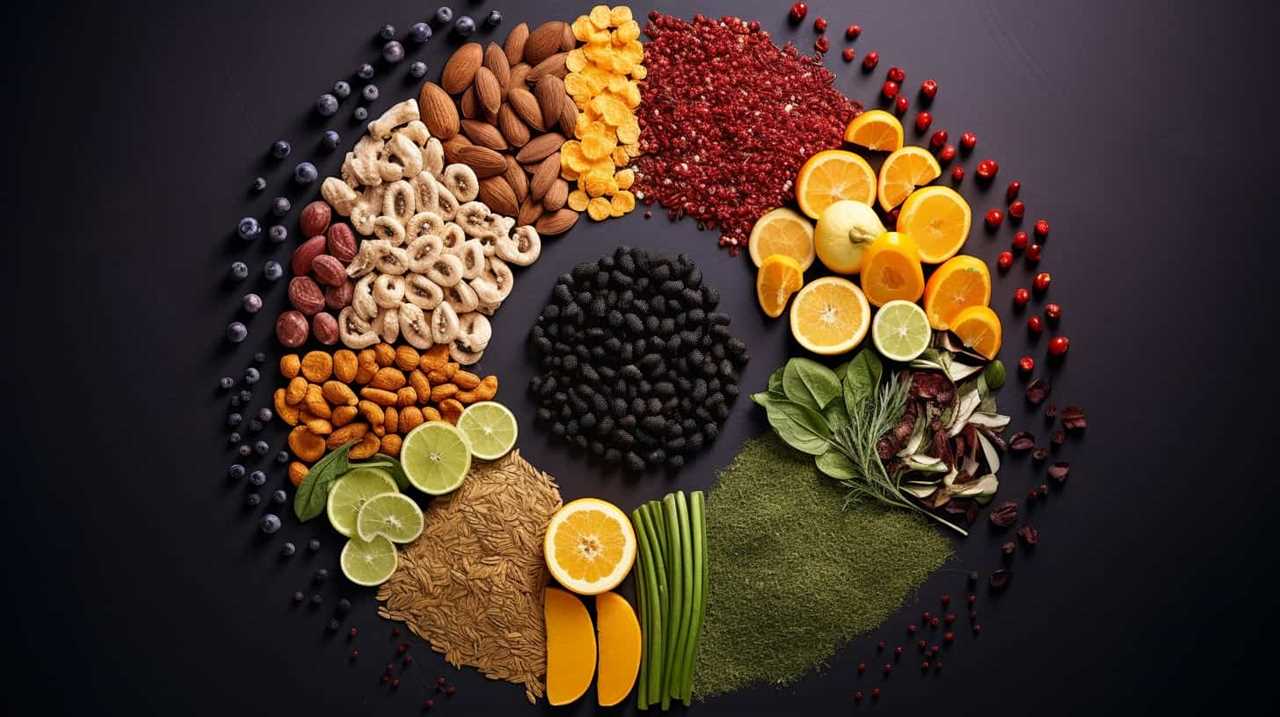
Chia Seeds: Boosting Protein Intake for Vegans
Continuing with the benefits of chia seeds for maximizing protein absorption, let’s explore how these seeds can boost protein intake for vegans.
Chia seeds aren’t only packed with protein, but they also offer a wide range of nutritional benefits. For non-vegan diets, chia seeds can be a valuable source of essential amino acids, which are crucial for muscle repair and growth. In fact, chia seeds contain all nine essential amino acids, making them a complete protein source.
When compared to other vegan protein sources like quinoa and hemp seeds, chia seeds stand out for their high protein content.
Additionally, chia seeds are versatile and can be easily incorporated into various dishes such as smoothies, puddings, and baked goods. By including chia seeds in their diet, vegans can effectively increase their protein intake while enjoying the many health benefits these seeds have to offer.
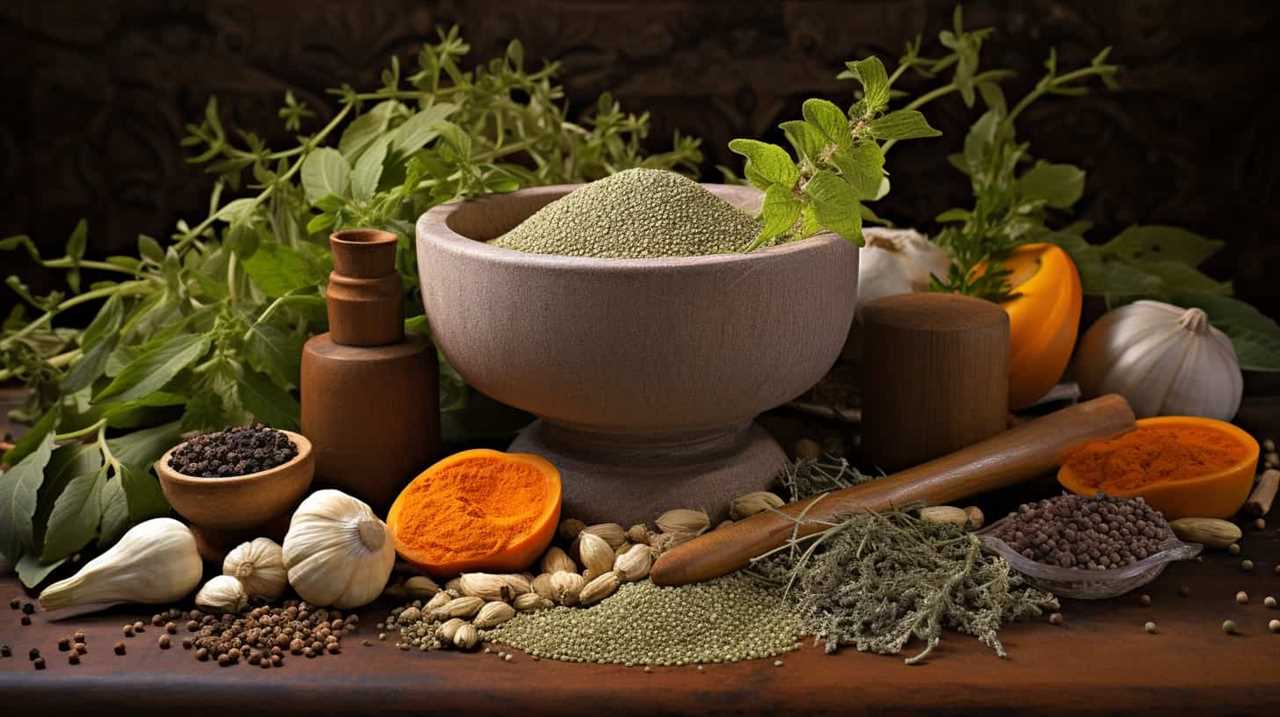
Chia Seeds: A Sustainable Protein Option for Vegans
As we delve into the topic of sustainable protein options for vegans, it’s important to highlight the environmental advantages of incorporating chia seeds into our diets. Chia seeds not only provide a rich source of protein but also offer sustainability benefits that align with the values of a vegan lifestyle.
Here are four reasons why chia seeds are a sustainable protein option:
-
Water conservation: Chia seeds require significantly less water to grow compared to other protein sources like animal products.
-
Reduced carbon footprint: Chia seeds have a low carbon footprint, as they don’t require intensive farming practices or contribute to deforestation.
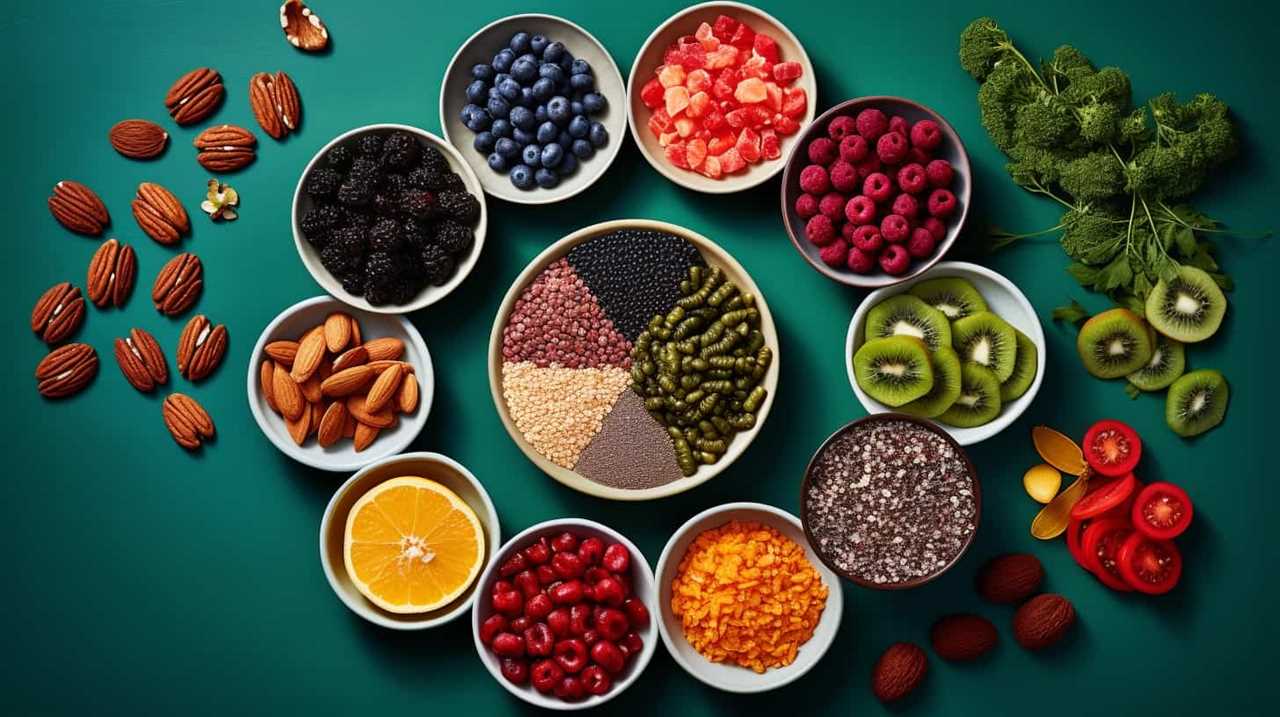
-
Biodiversity preservation: By choosing chia seeds, we support the preservation of diverse ecosystems and protect wildlife habitats.
-
Versatility in chia seed recipes: Chia seeds can be used in a variety of delicious recipes, making it easy to incorporate them into our daily meals.
By embracing chia seeds as a sustainable protein option, we can nourish our bodies while also promoting a more environmentally conscious way of eating.
Now, let’s explore how chia seeds can aid in muscle recovery for vegan athletes.
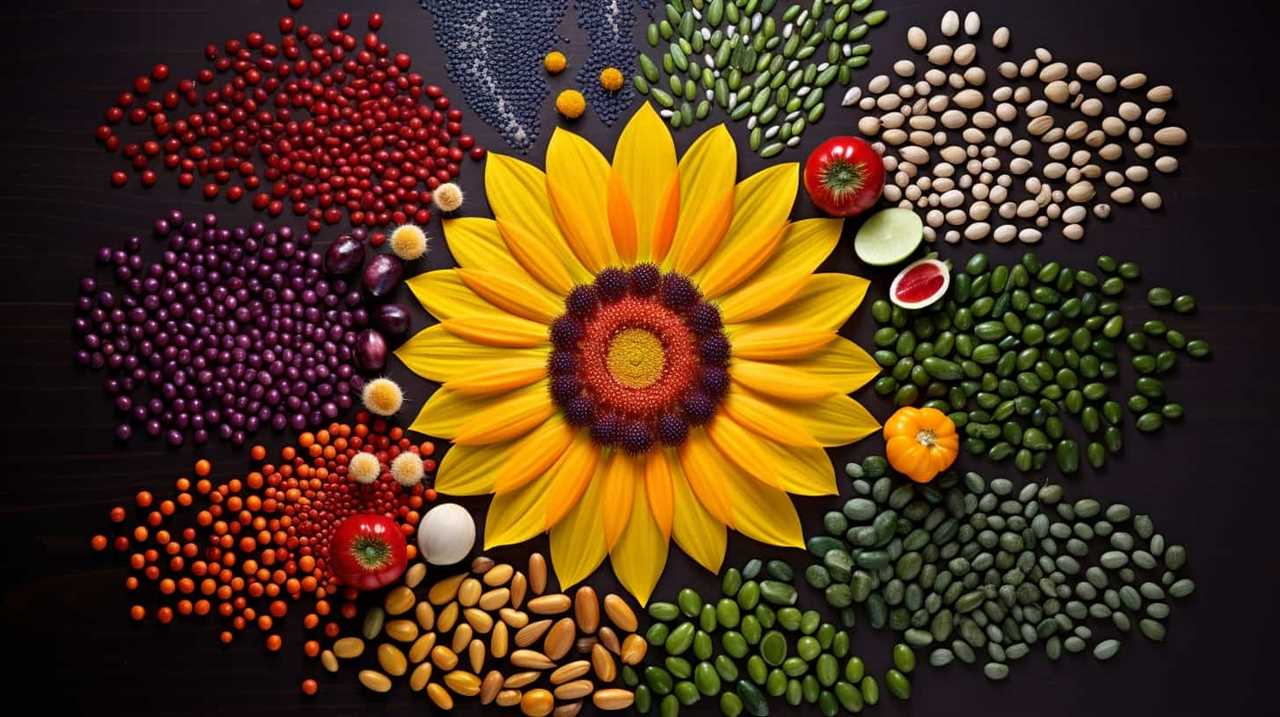
Chia Seeds and Muscle Recovery in Vegan Athletes
I maximize muscle recovery in my vegan diet by incorporating chia seeds as a high-quality protein source. Chia seeds aren’t only rich in protein, but they also contain all nine essential amino acids that are necessary for muscle repair and growth.
After an intense workout, these tiny seeds can play a crucial role in post-workout recovery for vegan athletes like me. Chia seeds are packed with antioxidants, fiber, and omega-3 fatty acids, which can help reduce inflammation, aid in digestion, and support overall health.
They can be easily added to smoothies, oatmeal, or even used as an egg substitute in baking. Including chia seeds in my vegan meal planning ensures that I’m getting the nutrients I need to support my active lifestyle.
Now, let’s explore how chia seeds are versatile protein powerhouses for vegans.

Chia Seeds: Versatile Protein Powerhouses for Vegans
One way to maximize protein in a vegan diet is by incorporating chia seeds as a versatile protein powerhouse. Chia seeds aren’t only rich in protein, but they also offer numerous health benefits. Here are four reasons why chia seeds are essential for vegans:
-
Importance of Omega-3s: Chia seeds are a fantastic source of omega-3 fatty acids, which are crucial for brain health, reducing inflammation, and supporting heart health. These essential fatty acids are particularly important for vegans, as they’re commonly found in fish.
-
Excellent Egg Substitute: Chia seeds can be used as an egg substitute in vegan baking. When mixed with water, chia seeds form a gel-like consistency, which can be used as a binder in recipes. This makes chia seeds a perfect alternative for eggs, especially for those following a plant-based diet.
-
Fiber-Rich: Chia seeds are packed with dietary fiber, promoting healthy digestion and regulating blood sugar levels. This can help vegans maintain a balanced and energized lifestyle.

-
Versatile and Nutrient-Dense: Chia seeds are incredibly versatile, making them easy to incorporate into various dishes. They’re also rich in essential nutrients like calcium, iron, and magnesium, which are vital for overall health and wellbeing.
Incorporating chia seeds into a vegan diet can provide an excellent source of protein, omega-3s, and other essential nutrients.
Frequently Asked Questions
Can Chia Seeds Be Consumed by People With Nut Allergies?
Chia seeds can be a great alternative to nuts for people with nut allergies. They are packed with protein and other essential nutrients, making them a nutritious option for those looking to maximize their protein intake.
Are There Any Potential Side Effects of Consuming Chia Seeds?
There may be potential health risks associated with consuming chia seeds, so it’s important to be mindful of your recommended daily intake. However, with proper knowledge and moderation, they can be a great addition to a vegan diet.
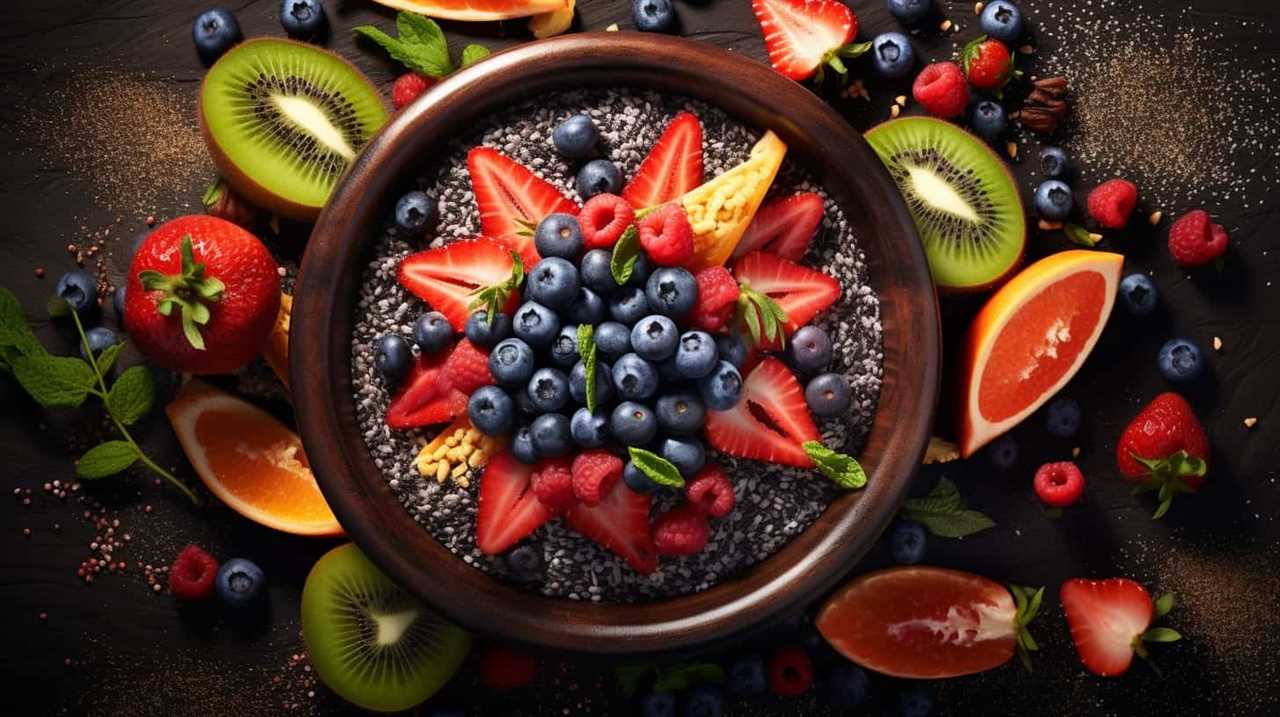
How Do Chia Seeds Compare to Other Vegan-Friendly Protein Sources in Terms of Protein Content?
Chia seeds are an excellent source of protein for vegans. When comparing their protein content to other vegan sources, they stand out. Incorporating chia seeds into a vegan diet can provide essential nutritional benefits.
Can Chia Seeds Be Used as a Protein Supplement for Vegan Bodybuilders?
Chia seeds are a great protein supplement for vegan bodybuilders. They have a high protein content and can be easily incorporated into vegan meal prep for optimal protein intake. Hemp seeds are also a good option, but chia seeds may be better.
How Should Chia Seeds Be Stored to Maintain Their Nutritional Value?
To maintain the nutritional value of chia seeds, store them in a cool, dry place away from direct sunlight. Incorporating chia seed recipes into my diet ensures a nutritious and fulfilling vegan-friendly meal plan.
Conclusion
In conclusion, incorporating chia seeds into a vegan diet is an effective way to maximize protein intake.
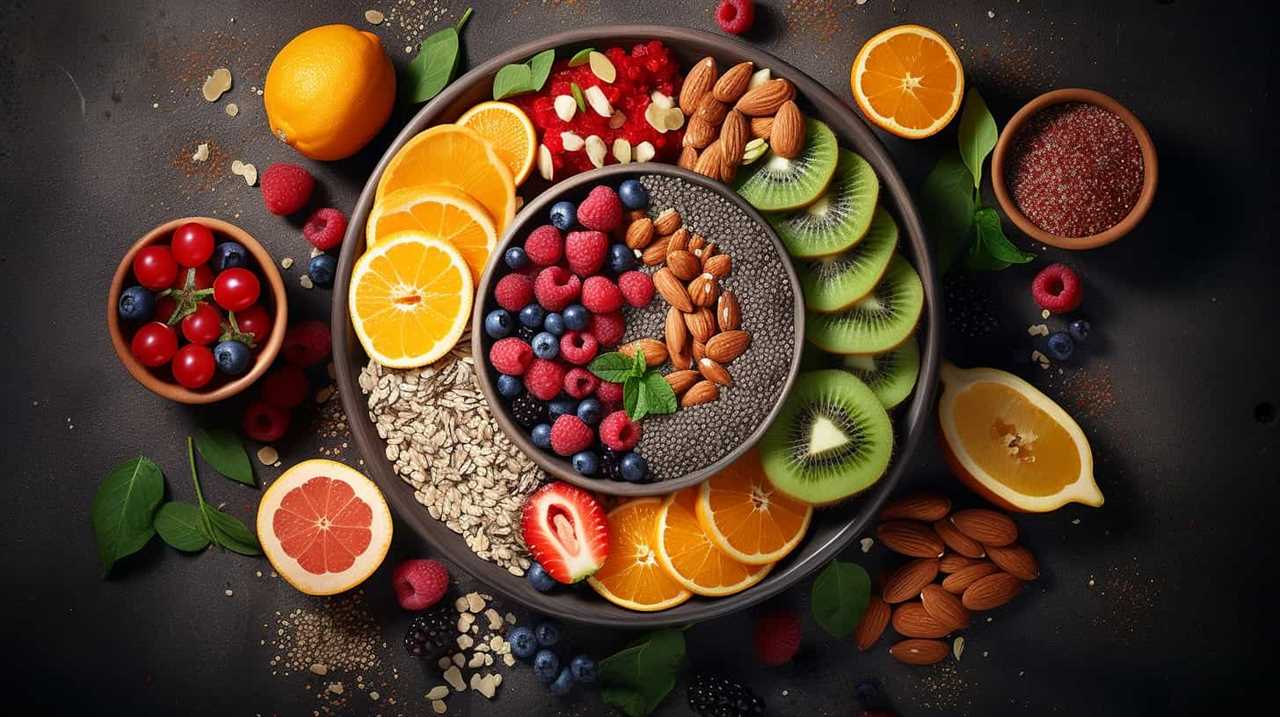
These versatile seeds not only provide a sustainable protein option but also offer numerous nutritional benefits.
Whether added to meals or used in recipes, chia seeds can help boost protein levels for vegans and aid in muscle recovery for vegan athletes.
With their powerful protein content, chia seeds are a must-have for those looking to enhance their plant-based protein sources.
Hi, I’m Sarah. I write for Turtle Tree Seeds, a news blog that loves food – all kinds of food. But especially bacon, chocolate, and veggies. We’re on a mission to show the world that you can enjoy all of those things, even kale and brussels sprouts. Because we believe that when it comes to food, there’s no such thing as guilty pleasures. Just pleasures.
I’m also a huge fan of puns (obviously).
-

 Chia Seeds3 months ago
Chia Seeds3 months agoCan Cats Have Chia Seeds?
-

 Chia Seeds3 months ago
Chia Seeds3 months agoHow Do Chia Seeds Go Bad?
-

 Chia Seeds3 months ago
Chia Seeds3 months agoDo Chia Seeds Make You Poop?
-

 Health Risks and Allergies Related to Chia Seeds3 months ago
Health Risks and Allergies Related to Chia Seeds3 months agoWhy Do Chia Seeds Gel
-

 Chia Seeds3 months ago
Chia Seeds3 months agoHow to Use Chia Seeds For Weight Loss
-

 Chia Seeds and Digestive Health2 weeks ago
Chia Seeds and Digestive Health2 weeks agoWhy Are Chia Seeds Beneficial For Gut Health?
-

 Chia Seeds3 months ago
Chia Seeds3 months agoHealth Benefits of Chia Seeds For Dogs
-

 Chia Seeds in Gluten-Free Diets2 months ago
Chia Seeds in Gluten-Free Diets2 months agoYour Dependable Guide: Chia as a Gluten Substitute


























